| Hot Topics |
| NewsKing.org |

| Feedback |
| List of Headings |
|
 |
|
||||||||||||||
|
||||||||||
|
|
|
||||||||||||
|
|
|
Guess what I got for Christmas? Assassin's Creed III for PC! Here's what I did to get it working with my laptop... Setup: My Best Laptop: - 9 months old - 2.13 Ghz Intel Pentium processor (similar processor may have appeared in laptops up to 2 years old) - Integrated Intel HD graphics - 4GB RAM (upgraded from 2GB at purchase) - Windows 7 Home Premium General Performance Issues: - I keep Windows and my anti-virus software up-to-date, and I'm really picky about what I install, what's running, which websites I visit, etc... Game Settings: Best Gameplay: - Options>Graphics Settings: All set to "Normal" (which is the minimum setting in each sub-category) - Single Player Computer Settings: Best Gameplay: - Intel HD Graphics>3D Graphics>Custom: Performance, Application, Default, Application - Intel HD Graphics>Display: 32 Bit Color - Intel HD Graphics>Power: Maxed out - Graphics Driver: No updates available (proprietary) - Windows Power Settings: Maxed out - MSconfig: Killed a couple startup services (including a couple of proprietary power-saving tools) - Windows Performance>Visual Effects: Performance The "Windows Performance>Visual Effects" setting is mixed up with "Themes," which is especially noticeable after switching the Visual Effects to Performance. After switching to Performance, I changed the Theme back to the way it was before, and that didn't seem to matter in terms of game performance. It may have mattered in terms of 32 bit color. I also tried switching back and forth from 16 bit and 32 bit color in "Intel HD Graphics" (while continually resetting "Windows Performance>Visual Effects" to Performance, just in case), and it seemed to make no difference in terms of game performance, but the game looked better with 32 bit color. The "Windows Performance>Visual Effects" setting still indicates Performance even though I changed the Theme back and ensured 32 bit color was selected in "Intel HD Graphics." Some people indicated better game performance by leaving the Theme alone after changing the Visual Effects to Performance, and ensuring 16 bit color was selected in "Intel HD Graphics." You guys know to use Alt-Tab to switch out of the game and test things out without having to restart the game, right? (Hold down Alt and press Tab while you're holding down Alt, then let go of both keys. To get back to the game, use the icon in the taskbar.) Intel HD Graphics Control Center is in Control Panel>Intel Graphics and Media. Windows Power Settings are in Control Panel>Power Options. You can get to MSconfig by typing "msconfig" (without the quotes) in the search box in the Windows/Start Menu (to manually stop a service - particularly a startup service - without restarting, go to Control Panel>Administrative Tools>Services and right click the service). Windows Performance is in Control Panel>Performance and Information Tools (then Adjust Visual Effects). To change a theme, right click the desktop and choose "Personalize." Gameplay: Here's the best performance I can get using what I believe to be the best settings: - In the "Cinematics" ("cut scenes" or "movie scenes"), the mouth movement and character movement is a little slow and lags behind the sound. - Everything in the "Testing Ground" and "Theater Sequence" seemed to work in a normal-to-slow-ish way. - Player movement aboard the ship is slow. - The two "Fight Sequences" on the ship went fine. It didn't seem slow. Normal-to-slow-ish, just like the "Testing Ground" and "Theater." - Player movement in "Boston" is very slow, but the game is playable and the character can run and interact. Walking at normal speeds is a bit agonizing, and requires patience. Some people reported that the frame rate was so slow in "Boston," the game was unplayable. People suggested a patch would come out, but judging from the frame rate I'm getting, the appropriate patch is not yet available (although a patch was downloaded during installation of the game, and it may be what's making the game playable in "Boston"). That's as far as I've gotten. The game does not crash, "tear," or appear to malfunction. I retested the settings above and they appear to be the best settings for this laptop in all the game locations and sequences I've described so far, including "Boston," which is noted in many online communities as the slowest location in the game. There do not seem to be any further steps I can take to improve gameplay, but if you buy a cheap laptop every few years and still haven't bought your Windows 8 one, Assassin's Creed III seems to be playable if you're not too picky... Of course, I have not completed the game... |
|
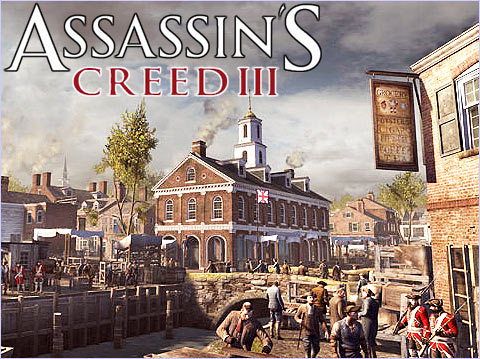 |
|
Artwork (may include photos, images, audio, and/or video): - http://www.ew.com/ew/gallery/0,,20641231_21230916,00.html - http://www.sodahead.com/entertainment/what-video-game-are-you... |
|
|
|
These are some recent games I've either played or want to try. All the games I've played were played on the same laptop described in the post above entitled Assassin's Creed III Performance Tweaks. Two of the games are a few years old, and in addition to playing them on my current laptop, I played them on my previous laptop and a desktop PC. The performance of those two games was roughly the same as on my current laptop. See the post above for information about my laptop and how I recently set it up to optimize game performance for Assassin's Creed III... Fable: The Lost Chapters: - The game performed flawlessly. |
|
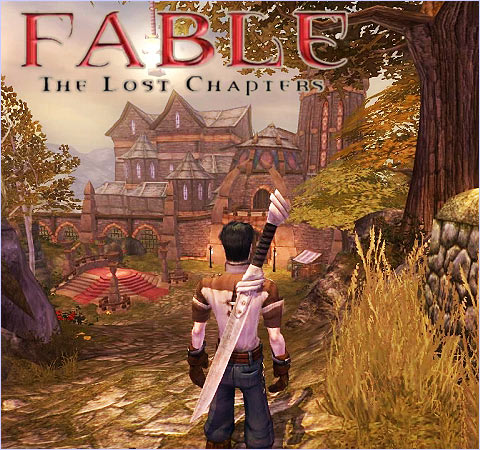 |
|
Fable III: - Fable III is believed by a number of online communities to not work very well with this laptop, so I didn't buy it... - I'm now thinking it might work at least as well as Assassin's Creed III, especially with the new tweaks to the laptop, so I may give it a shot... |
|
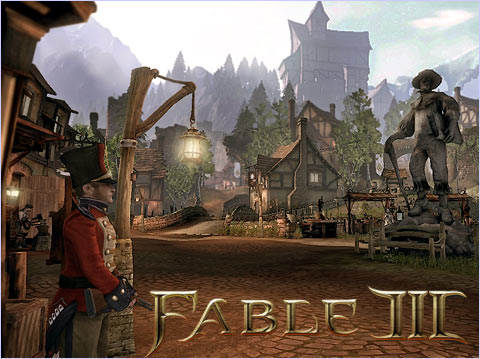 |
|
The Elder Scrolls: Oblivion: - The game performed very well with a few tweaks to the game's graphics/video settings. |
|
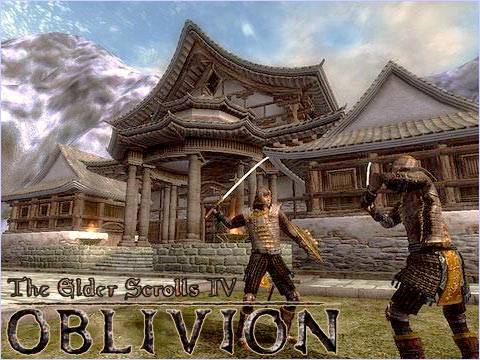 |
|
The Elder Scrolls: Skyrim: - The game performed very well with a few tweaks to the game's graphics/video settings. - Dragon killing was sluggish, but using the console commands "tcl" and "tgm" made it easy to kill the dragons quickly and move on... - You can get a console command prompt on the PC version by pressing the ~ key (same goes for Oblivion). |
|
 |
|
See Also: - Assassin's Creed III Performance Tweaks Artwork (may include photos, images, audio, and/or video): - http://www.gratisjuegos.org/descargar/fable-the-lost-chapters-full-iso... - http://article.wn.com/view/2012/09/11/Greatwood_end_Cheltenham... - http://www.dpadmagazine.com/2010/10/31/fable-iii - http://blastmagazine.com/the-magazine/gaming/gaming-news/fable-iii... - http://www.knightsgame.net/the-elder-scrolls-iv-oblivion-game.html - http://phateeg.deviantart.com/art/Oblivion-38072351 - http://1080hdwallpapers.com/new-skyrim-wallpaper-hd/skyrim-wallpaper... - http://steamcommunity.com/sharedfiles/filedetails/?id=81263039 |
|
||||||
I am disturbed by the number of people on the left who want to poison mental healthcare with government profiling. Right now it's guns, but it could be anything... I know a majority of those involved in mental healthcare are on my side, even though they may not be saying much right now... I also know pharmaceutical companies are mixed up in all of this... Unfortunately, I think many in the mental healthcare community are remaining silent and hoping nothing happens, instead of advocating for improved mental healthcare without implying that government profiling counts as an improvement... And ultimately, the question is being posed: "Do you want a little government money for mental healthcare? Then shut the fuck up about the profiling!" I stuck an article below that might not be a perfect fit for this post, but it's really good and worth reading. Something like that should probably get its own post... Related: - http://www.nytimes.com/2012/12/23/opinion/sunday/anatomy-of-a-murder-suicide... |
||||||
|
||||||
In the aftermath of the Newtown, Connecticut school shooting, I've been following the debates about gun control. On December 21st, the NRA held a conference and spewed out more of its lunacy. Not only did their statements seem un-researched, I don't even think they bothered to Google many of the points they argued before they argued those points. But one of the topics that has come up over and over again in the course of debates about the Connecticut shooting is violent video games. This is something I've already written about, but I think people are starting to catch on... One point made repeatedly in gun control debates involved sales of violent video games in "other countries" and the rate of violence in "those countries." So, do the games play a role with regard to gun violence in America? Sure. In America, you can go out get and the weapons used in the games. Add to that the fact that America is awash in guns, and the place seems like a war zone. Players suddenly find themselves in an environment where game violence seems real. That could happen to anyone, anywhere. However, it can at least be said that such an environment does not exist in "other countries." Ban the military-style weapons, and you change - to some extent - the way the games seem. Of course, the games are still violent, and that no doubt has an impact - even in "other countries." Remembering the powerful role violence plays in the human psyche is important if you're going to dispute this point. The games are popular because they're violent... That said, let's not lose sight of the fact that banning certain weapons will improve public safety. But it's a cultural change, too... Which brings us to American culture. The most popular violent video games are military-themed. Players fight American wars with American weapons. We just had six Navy SEALS get two months suspended pay and lose their ability to ever be promoted in the Navy again for showing equipment and sharing information with video game makers. But the military makes its own games, so it's not as though they're against violent, military-themed video games. The "war culture" - and the violent, military-themed video games that result from it - are a result of the military's influence in American culture. We even had a U.S. president warn us about it in advance... President Eisenhower warned us about the influence of the military industrial complex on American culture, "sought or unsought..." Combine this with American "vigilantism" and an existing gun culture, and you start to get the picture. Vigilantism is just the idea that you can do whatever you want, and not let laws or the government stop you. And it goes along with guns, except the war is against other gun-owning Americans... which brings us back to the violent, military-themed video games... Now add a lackluster mental healthcare system. Oh, and add talk of government profiling to the idea of mental healthcare in order to "keep guns out of the hands of crazy people." Who's crazy? Gun owners? We can eventually solve all of these problems in the U.S., but we have to take a step in the right direction and start with gun control. Not only will gun control make America safer, it will have a tremendous cultural impact. And it's something most Americans want... |
||||||

|
||||||
| Sex and violence sell? OMG! Mind = Blown! | ||||||
Related: - http://www.spiegel.de/international/world/commentary-newton-and-the-fatal... - http://www.dw.de/opinion-the-nra-sticks-to-its-guns/a-16474714 - http://www.guardian.co.uk/technology/2012/mar/18/video-games-propaganda... - http://www.theatlanticwire.com/politics/2012/12/nra-vs-old-video-games... See Also: - Gun Control Now! - Assassin's Creed III - Crazy? - Do You Fit the Profile? - Meet Nate - WarGames! - FBI's Most Wanted: Pothead Military Recruits - Signs, Signs, & Everywhere Signs: Warning About Violence, Sex, & Television Artwork (may include photos, images, audio, and/or video): - http://wallpapersget.com/model-sexy-girls-and-gun-funny |
||||||
|
||||||
There is little doubt that America has a serious and growing problem with mass shootings. There have been at least seven this year where four or more people have been killed. Yet despite the violence the U.S. Congress has not enacted any major firearms regulations other than a law aimed at improving state reporting for federal background checks. Indeed, regulations have actually loosened over the last decade as a 1994 assault-weapons ban expired in 2004. Most of the current debate in American policy circles has actually been around the issue of expanding citizens' rights to carry firearms openly in public. Much of the problem comes down to the immense power of the NRA and other gun lobby groups who contribute large sums of money to politicians, especially Republicans, but also do enjoy popular support with many Americans. Up to now, Republican opposition to federal laws regulating the sale of arms has made reforms impossible. In order to safeguard its economic interests, the NRA frames the possession of weapons as a cultural singularity, which needs to be saved and defended. And any kind of reform or criticism of existing laws is branded by the NRA as an attack on civil liberties. The NRA relies, for its existence, on the appearance of persecution - or, in the absence of any actual persecution, on the illusion of it. The United States has slipped its moorings and drifted into a realm of profound national lunacy. Ponder, for a second, the fact that I cannot walk into many drugstores today and purchase half-a-dozen packages of Sudafed, but I can walk into a gun dealership and purchase a .50 caliber rifle of the sort that U.S. snipers use in Afghanistan. Let's talk about common sense gun control, not the NRA's lunacy... There is little we can do right now about the guns already out there. So, in addition to the first and most obvious idea - that the U.S. needs to reintroduce something like the 1994 "assault-weapons ban" - a second fix should be to ban high-capacity magazines (a "magazine" is an ammunition storage and feeding device used with a repeating firearm, including automatic and semi-automatic firearms). The only non-military context in which a high-capacity magazine proves decisively useful for the shooter is one in which he or she is trying to mow down as many civilians as possible before getting killed by a SWAT team. Third, a limit should be imposed on the number of firearms that can be purchased. A forth change should be to mandate a criminal background check for all gun purchases. Under the Brady Act, federally licensed gun retailers are required to do a background check before selling a customer a firearm. But an estimated forty percent of gun sales today are "private" sales not involving a licensed dealer: these transactions take place at gun shows, in parking lots, and increasingly, on the Internet. Private sales do not require a background check. There are bills pending in Congress that would force checks for all sales, and there is considerable bipartisan support for this kind of measure. |
||||||

|
||||||
| Let's Stop This... | ||||||
Related: - http://www.guardian.co.uk/world/2012/dec/15/newtown-school... - http://www.dw.de/press-review-american-god-of-arms-insatiable... - http://www.newyorker.com/online/blogs/newsdesk/2012/12/making... Artwork (may include photos, images, audio, and/or video): - http://www.drawger.com/edel/index.php?article_id=13856 |
||||||
|
||||||
On Dec. 14, 2012, 20-year-old Adam Lanza shot and killed 27 people at a Connecticut elementary school, including himself. 20 of the victims were very small children, and 7 were adults. A 28th person - reported to be Lanza's mother - was shot and killed at her home. Please join me in expressing condolences to the families and friends of those killed or injured. Related: - http://www.courant.com/news/connecticut/hc-timeline-newtown... |
||||||
|
||||||
Apparently, plant-based plastic bottles have been entering the market over the last few years, but I just noticed the label on my Heinz Ketchup... (I was eating French fries...) - http://www.pepsico.com/PressRelease/PepsiCo-Develops-Worlds-First... - http://www.coca-colacompany.com/our-company/introducing-plantbottle - http://www.heinzketchup.com/plant-bottle-packaging.aspx Some humor... When Mr. Potato Head first came out, you had to supply your own potato. Then they switched to the plastic potato. So, now I guess the plastic potato could be made from potatoes... Get it? |
||||||

|
||||||
See Also: - New Fuel Cell Battery Powers 1400 Homes Artwork (may include photos, images, audio, and/or video): - http://www.heinzketchup.com/plant-bottle-packaging.aspx |
||||||
|
||||||
There's an ongoing hunt through carefully worded material for this... It should be obvious to everyone at this point that it's a hunt... Something way beyond just sketching it out... I'm lettin' it ride... It's fun and it's an honor, so don't worry... I need to know more about how the Higgs field operates in terms of relativity theory, and that's all going to be theoretical and take a long time to debate... I also think it's wrong to keep shoving a photon into a paradoxical object (or the other way around) like that (there's a whole section on that)... I have absolutely no idea where people went with what I've already written, but I'm glad I worded it the way I did... There also appears to be an effort to paint my understanding of this in a certain light, and I'm fine with that... As my mentor said, "If you can't explain it to T.J., no one will understand what you're saying..." I'm still adjusting to the idea that it's all being taken so seriously... No wonder I can't see who is hitting this site! Sure would be nice to solve that mystery... It would explain a lot about my life... |
||||||

|
||||||
See Also: - More Thoughts on the Higgs - The "God Particle" - Quantum Field Theory - Descartes & Imaginary Time |
||||||
|
||||||
Rolling Jubilee is a Strike Debt project that buys debt for pennies on the dollar, but instead of collecting it, abolishes it. Strike Debt is an offshoot of Occupy Wall Street, and believes people should not go into debt for basic necessities like education, healthcare, and housing. "Jubilee" comes from many faith traditions, including Judaism, Christianity, and Islam. A jubilee is an event in which all debts are cancelled and all those in bondage are set free. Banks sell debt for pennies on the dollar on a shadowy speculative market of debt buyers who then turn around and try to collect the full amount from debtors. What should actually surprise everyone is the fact that it is legal to trade in people's misfortune. As part of the deregulation of the finance industry, the government made it legal to buy and sell charged-off debt. The Rolling Jubilee intervenes by buying debt, keeping it out of the hands of collectors, and then abolishing it. Contribute! |
||||||

|
||||||
Related: - http://rollingjubilee.org Artwork (may include photos, images, audio, and/or video): - http://rollingjubilee.org |
||||||
|
||||||
 |
||||||
|
An Era Of Peace, Prosperity, & Happiness Is Beginning... SO LET'S PARTY!!! |
||||||
Somehow, I want to put these two songs together to go with this... Maybe add some other songs, too! |
||||||
|
|
||||||
On October 29th and 30th, 2012, thousands of people from more than a dozen U.S. states were devastated by hurricane Sandy, and are now in need of food, shelter, and comfort. Communities throughout the U.S. Mid-Atlantic and Northeast are suffering from widespread power outages, wind damage, significant flooding, and fire damage. Though the storm raged up the East Coast, it has become increasingly apparent that the U.S. state of New Jersey took the brunt of it. Officials estimated that the state suffered many billions of dollars in property damage. About a quarter of the state's population - more than two million people - remained without power on Wednesday, and more than 6,000 were still in shelters, state emergency officials said. At least eight people died, and officials expressed deep concerns that the toll would rise as more searches of homes were carried out. The Mid-Atlantic and Northeast states need your help! Please help now by donating to the Red Cross. Here are some ways to donate: - Use this link: https://american.redcross.org/donate/index... - You can also text REDCROSS to 90999 on your mobile phone to donate $10 to relief efforts. - Or, call 1-800-REDCROSS (1-800-733-2767) to give money or schedule a blood donation. A number of other charities have been brought to my attention either by email or through promotion. The New York Blood Center is urging people to donate blood for those in the New York/New Jersey area: - Use this link: http://www.nybloodcenter.org - Or, call 1-800-933-2566 to donate blood. ABC News has put together a list of other ways to donate to help the U.S. Mid-Atlantic and Northeast: - http://abcnews.go.com/US/hurricane-sandy-victims/story?id=17598687#... Many of these sites continue to take donations for other disasters throughout the world. As you make your donation to help the U.S. Mid-Atlantic and Northeast, consider helping provide much-needed relief to victims of other disasters. Related: - http://www.redcross.org/news/press-release/Red-Cross-Responding-as... - http://www.nytimes.com/2012/11/01/nyregion/new-jersey-continues-to... - http://abcnews.go.com/US/hurricane-sandy-victims/story?id=17598687#... See Also: - Help the Heartland - Help Missouri & Arizona - Help U.S. Spring Flood Victims - Help Tornado & Wildfire Victims in Southern U.S. - Help Japan |
||||||
|
||||||
This week, Britain's Labour party leader, Ed Miliband, spoke about the "social stigma" of receiving mental healthcare in Britain. This is an important issue, not only in Britain, but throughout the world. Opponents of mental healthcare in Britain, for example, called people with depression "cry babies." Getting rid of these attitudes is a positive development for mental healthcare in Britain - and for the rest of the world - because now people can carry on with the help they need and without the stigma they don't... |
||||||
 |
||||||
Related: - http://www.guardian.co.uk/society/2012/oct/29/ed-miliband-time-mentally-ill - http://www.bbc.co.uk/news/uk-politics-20117661 Artwork (may include photos, images, audio, and/or video): - http://www.independent.co.uk/voices/comment/the-government-must-be... |
||||||
|
||||||
This will be the first post on NewsKing about a specific video game. Assassin's Creed III is set during the American Revolutionary War and features graphic violence between British and American characters. The marketing for the game's release, the plot described, and the choice of characters all seem anti-British, and the game has been widely criticized. I find it offensive and politically destructive, but I've also been reading about it and watching numerous videos on the game. I threw in a couple of links, but the best thing to do is Google it if you're curious about what people are saying... Anyway, here's what I came up with after taking everything I could find into account. It's based on the "Boston Tea Party" trailer for the game - the one that jumped out at me... While it is difficult to decipher some of the more twisted generalizations behind the plot of this game, I do know a little about the American Revolution. I could check the details on all of this, but after watching the trailer, this should seem heavily researched. Here's my storyline... A wealthy businessman named Samuel Adams didn't like paying taxes. Not just British taxes - any taxes. He noticed discontent among colonists over new taxes to be paid to Britain. As the colonists tried to work a deal with Britain, some say he worked behind the scenes to get people fired up. According to a number of historians, he may have been behind the Boston Tea Party. There was indeed a Boston Tea Party in there somewhere. By the time the Revolutionary War began, the British had offered to repeal the tea tax. The Americans refused to negotiate. Adams is thought by some to have enlisted the help of a writer named Thomas Paine at this time to help stir the masses into revolution. Paine wrote about fairness and justice and all of that, but Adams didn't care, as long as people got angry about taxes. The war started and the British offered an early truce, but the Americans were too fired up... After the war, Adams may have tried to write Thomas Paine out of history with the help of other tax-hating elites. Today, even Fox News has criticized Paine, while promoting the present-day Sam Adams Society - a society associated with the present-day "Tea Party." I don't know the story with Sam Adams beer, but I know their ads once featured George H.W. Bush. The trailer mentioned the "real story" of the American Revolution, and much has been said about the Revolutionary War as a backdrop for a plot in the game about Templars vs. Assassins. The hero, an Assassin, may be a Thomas Paine-type character, at least in part. But Paine, who was born in England, was anti-British. The hero of the game has been cleaned up so as to defeat the British with a troubled heart, but ultimately, still appears anti-British... It's tough terrain to navigate, and it doesn't look like it was done with a troubled heart... At all... But as Ubisoft's best-selling game ever, maybe it can be saved as an early effort at... something... |
||||||
 |
||||||
A month or so ago, I met a 10 year old named Steve who was the son of a friend of a friend. Like Nate, Steve had ADHD, but unlike Nate, Steve also had Asperger's disorder (Asperger's disorder is thought to be similar to autism, and may eventually be diagnosed as a form of autism as opposed to a separate disorder). Anyway, Steve was into video games. He also claimed to be into politics. When I asked him what he thought America's biggest political issue was, he said he thought America should kill all of the Germans and Russians. Apparently, he had been playing violent war-themed video games with WWII and Cold War themes. When I explained to him that the Germans and Russians were now our friends, and that his plan (he had an evil plan) wouldn't work, he asked who America should kill. I convinced him that he needed to choose sides between Wendy's and McDonald's. He chose Wendy's. When he and his mother left, I asked his mother to take him to Wendy's for a Frosty. I thought that might seal the deal... But she refused, because she didn't want to give him any more sugar (he'd just had a Slurpee at 7-11). Steve is smart, and is from a good family and goes to a good school. So, he'll probably turn out fine. However, with or without ADHD or Asperger's, children can form political opinions at an early age based on nonsense like Assassin's Creed III. It's easy to imagine a kid who is not very smart, not from a good family, has dropped out of school, and has formed opinions mainly based on video games - a kid who becomes an adult and wants to kill the Germans, Russians, and now the British. A kid who'd vote for Sarah Palin... So, in my opinion, this game is not only bad because of the violence, but also because of the theme... I can't remember if I've mentioned this before, but the U.S. state of California wanted to prohibit sales to minors of violent or explicit video games. However, the proposed law was shot down by the U.S. Supreme Court. So, a lot of work has already been done on this, and there is a way through it without restricting free speech or having to listen to the industry say "it's not our fault Steve is a dummy" or whatever similar ideas they point to either in law or controversial studies. Related: - http://www.ign.com/videos/2012/09/27/assassins-creed-iii-boston-tea... - http://www.egmnow.com/articles/news/assassins-creed-iii-dev-weve-got... - http://gamerant.com/assassins-creed-3-anti-british-bias-brian-154567 - http://en.wikipedia.org/wiki/Assassin%27s_Creed_III - http://en.wikipedia.org/wiki/American_Revolution - http://en.wikipedia.org/wiki/Samuel_Adams - http://en.wikipedia.org/wiki/Thomas_Paine - http://www.aspergers.com See Also: - Meet Nate - WarGames! Artwork (may include photos, images, audio, and/or video): - http://www.ign.com/wikis/assassins-creed-3 |
||||||
|
||||||
Around this time last year, YouTube unveiled a new music channel that featured numerous music genres, and a cool new interface. Since that time, it has slowly become more difficult to navigate to the music channel from the home page. But the big story here is that last week they eliminated many of the genres. Of course, this doesn't mean that your favorite music can't be found on YouTube. What it means is that you can no longer just click "Alternative Music" on the YouTube music channel and let the music play. You also can't click a genre and select from listed music artists. This is not the first time YouTube has done something like this to its music channel. I mentioned that YouTube launched a new music channel last year around this time featuring numerous genres. But just six months prior to that, YouTube cut many of those genres from an even earlier incarnation of its ever-changing music channel. I posted about it, then took the post down after the genres were restored. I also promoted their music channel after they restored the genres - a promotion which I've removed... It is a mystery to me why this keeps happening. But I encourage everyone to contact YouTube and tell them to include your favorite music genre. I contacted them today! |
||||||
 |
||||||
| NewsKing is not affiliated with YouTube, and does not endorse YouTube products or services. | ||||||
|
||||||
Artwork (may include photos, images, audio, and/or video): - http://en.wikipedia.org/wiki/File:Stratocaster_003-2-2.jpg - http://www.maxishine.com.au/forums/viewtopic.php?f=38&t=16935&view=previous - http://www.allmusic.com/album/get-sharp-r2154066/credits - http://www.youtube.com/watch?v=hamKl-su8PE |
|
|
I'm currently staying in a hotel with both 802.11n and 802.11g WiFi Internet connections (they even went to all the trouble of two separate routers!). Windows 7 ranks both connections as "excellent," and I'm having no problems staying connected to the Internet... However, it's difficult to view pages with certain elements that require a lot from my connection. So, I sorta checked out all my favorite Internet sites but couldn't really dig in... Anyway, perhaps improvements could be made with regard to Internet connectivity... |
|
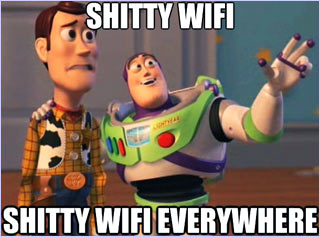 |
|
Artwork (may include photos, images, audio, and/or video): - http://www.quickmeme.com/meme/3635ck |
|
|
|
So, what's the deal with Mitt Romney's economic agenda? It's an agenda that many Republicans have been preaching for a long time, and one that I, along with most Democrats, have been fighting for a long time. If you lower taxes on the wealthy and cut spending without generating revenue, it won't "create jobs." Create them from what? Growth requires innovation in a suitable market environment. Take energy as an example. Without investment in green energy, there won't be any green jobs! You can't just lower tax rates on the wealthy and expect jobs to be created. It will just be a repeat of the policies that caused an economic crisis under the Bush administration. But it gets worse. If you cut social programs in a so-called quest to cut spending, you'll take away people's ability to find a job! How are they going to pay for the laptop, car, and gas they need to find a job? And what about rising healthcare costs on businesses? That would offset any gains made in lowering taxes on the rich and slowly make matters worse. Social programs are going to always be needed because when unemployment falls below 3%, it is unsustainable. People have to be able to change jobs, or else you end up propping up an industry - like the oil and gas industry - with taxpayer dollars. In the case of the U.S., the Republicans fund the oil and gas industry through expensive wars. There will also be no way for most Americans to replace things like broken kitchen appliances if they cannot change jobs. Those purchases are what keep people like Mitt Romney in business. America will end up with a third world economy under Romney's plan - a society with a handful of rich people and a massive underclass unable to innovate, express their ideas, start a business, or form opinions without permission from people like Mitt Romney. After enough time goes by, even the wealthy won't be able to survive, because no one will have enough money to buy the products and services they offer... |
|
|
|
Japan's Industry Minister recently announced the country must give up nuclear power plants as soon as possible. Industry Minister Yukio Edano said nuclear power's cost is too high. "Now I want to eliminate nuclear power plants as soon as possible," he wrote in a book, "Even if I get a beating, I must say this." The move represents a turnaround in Japan's energy policy. Minister Edano came to the conclusion after seeing "what was believed to be masterpiece of modern technology succumb to natural disaster so easily." Japan's government adopted a plan in September, 2012 to phase-out nuclear energy by 2040. Edano also stressed the need to end the monopoly in the power industry to help promote renewable energy, and speed up nuclear phase-out. Related: - http://www.huffingtonpost.com/huff-wires/20120929/as-japan-nuclear |
|
|
|
| Modern air conditioning was invented by an American from New York named Willis Carrier in 1922 (1). Carrier (the company that bears Willis Carrier's name) continues as a manufacturer of air conditioning units to this day. It also appears Willis Carrier contributed to the understanding of what is today called the "refrigeration cycle," which is the concept behind what makes air conditioners and refrigerators work. But, the story that brought us modern air conditioning is, of course, much longer and more complex. There were earlier scientists who figured out some of the basic concepts behind the modern refrigeration cycle, and inventors who gave it a shot and hit dead ends. For example, in 1820, British scientist and inventor Michael Faraday discovered a way to chill air using ammonia. And in 1842, Florida physician John Gorrie invented an ice-making machine. He hoped eventually to use his ice-making machine to regulate the temperature of buildings. He even envisioned centralized air conditioning that could cool entire cities. But his prototype leaked and performed irregularly, and his chief financial backer died. Dr. Gorrie died impoverished in 1855, and the idea of modern air conditioning faded away for more than 50 years... |
|
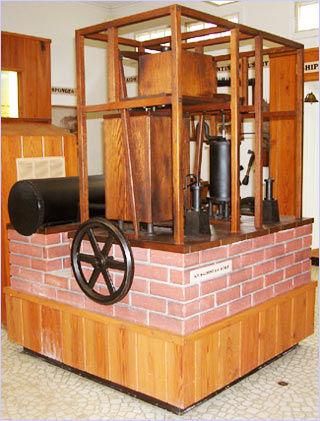 |
|
| Gorrie's Ice Machine | |
Here's the basic physics... So, in the world of physics, there are laws and experiments dating back to at least 1700 that describe the basic concepts behind how modern air conditioners work (2). But, there are a lot of different ways of looking at all of it. Let's call the area of physics I'm going to talk about "the gas laws" for simplicity. (Gas like "air," not like gasoline.) It appears as though in 1802, French chemist Joseph Louis Gay-Lussac described the concepts I'm talking about most similarly to the way I'm going to use to describe how modern air conditioning works. One of Gay-Lussac's contributions to the "gas laws" is nicknamed the "pressure law." For our purposes, it works like this (within what's called the "combined gas law"): when you increase the pressure of a gas within a given container volume, the temperature of the gas increases. When you decrease the pressure, the temperature of the gas decreases. It's like depressurizing a portable propane tank. It feels colder. If you've ever used a portable propane grill, you can feel the canister get colder as the pressure is released... Gay-Lussac meant that if you increase the temperature of a propane tank, the pressure increases, and if you decrease the temperature, the pressure decreases. But the "combined gas law" covers changing the amount of gas, and therefore the pressure, to get a change in temperature. Other "fathers" of the "combined gas law" include British philosopher, chemist, and physicist Robert Boyle; French inventor, scientist, and mathematician Jacques Charles; and Italian physicist and savant Amedeo Avogadro. |
|
 |
|
| Artist's
rendition of Texas cartoon character Hank Hill holding a large propane canister... Many people consider Hank Hill the world's most famous propane salesman... |
|
This is the problem that Carrier eventually solved... A fair number of scientists knew about the relationships between gas, pressure, temperature, and volume for a long time, but most people didn't think about using these ideas for air conditioning. You couldn't make something colder by increasing and then decreasing the pressure, because the temperature would just increase and go back to roughly the same as it was before. |
|
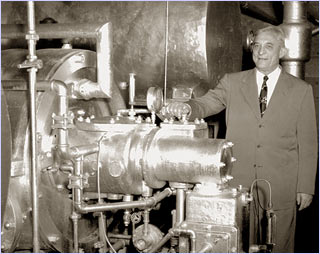 |
|
| Willis Carrier pictured with the first modern air conditioner in 1922 | |
| So, here's the refrigeration cycle... What if you pressurized a container with a gas from inside, where it's cooler, but pumped that cool inside gas outside for the pressurizing? The gas is going to heat up hotter than the outside temperature anyway, especially if you get the pressure high enough. Now, blow some outside air on the container to cool it back down to the outside temperature. See what you've done? You've gotten rid of some heat without heating up the inside of your home or building in the process. Now try depressurizing the container back inside. With the right gas, you can come out significantly colder than when you started. Keep reading, because you're not really breathing that gas when you enjoy air conditioning. Anyway, got it? Do this over and over and you have the basics of the refrigeration cycle. Here's how it works... Turns out the best gas to use was ammonia, and later, Freon, which have mostly been replaced by more modern "refrigerants." So, let's just say "refrigerant" instead of ammonia or Freon. And let's keep going with air conditioning - we can do refrigerators in a bit. Air conditioners have an outside part and an inside part. You may see a window or wall unit, or a system that has two sections - one in the basement, garage, or attic, and one outside - used to cool an entire home or building. No matter which type of unit is used, the process starts outside, where it's hot. The refrigerant is pumped into a container on the outside part until a high pressure is reached... They use a coil for the container, which is like a spiral, skinny pipe, to make it easier to cool off the refrigerant once it is pressurized. (The outside coil is called the condenser coil, and the pump is called the compressor.) The condenser coil typically gets hotter than the temperature outside. Then a fan blows on it to cool it back down to the outside temperature (sometimes the trip through the coil is enough - no fan needed). Next, the refrigerant in the condenser coil is pumped into another coil located inside a home or building. As the refrigerant enters the inside coil, the pressure is released, making the inside coil significantly cooler than the temperature outide of the home or building. (The inside coil is called the evaporator coil.) Another fan blows over the evaporator coil, and cold air blows out of the unit, ultimately lowering the temperature of a home or building. The evaporator coil and fan is sort of like putting a fan in front of a block of ice (a sealed metal box containing a block of ice). Finally, the refrigerant is pumped back outside, where the whole process repeats. It will be more efficient after the home or building cools off, because the refrigerant will be cooler when it's pumped back outside. Even if the inside unit is located in a hot attic, the air it blows over the evaporator coil is from inside the home or building. The refrigeration cycle! |
|
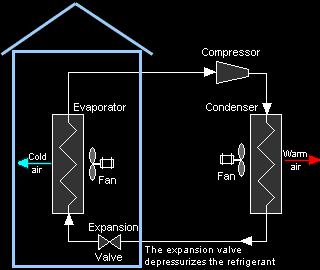 |
|
The Refrigeration Cycle |
|
It's important to note that no refrigerant is released into the air during the refrigeration cycle. The refrigerant stays inside the coils and pipes, and the evaporator coil just gets really cold. Air - regular air from a home or building - just blows across the evaporator coil. You're not breathing anything but regular air! (Assuming there are no leaks. Have your unit serviced regularly, and replace it when it's time.) The Refrigerant Debate... One of the biggest problems with air conditioners is the impact of leaked refrigerant on the environment. Most of the refrigerants used today deplete the ozone layer, which protects the Earth from the Sun's harmful rays. Today's refrigerants are also greenhouse gases, which contribute to global warming. Some alternatives to today's refrigerants can be highly toxic even at low concentrations, or potentially explosive. There are safe refrigerants that do not deplete the ozone layer available, but they are over 1000 times worse than carbon dioxide (CO2) as greenhouse gases. So, why not just use carbon dioxide as a refrigerant? We know it makes a good refrigerant because it was used back in the 1920's. And it's safe, does not affect the ozone layer, and has the smallest possible impact as a greenhouse gas compared to other refrigerants. Turns out, many countries are switching to carbon dioxide as a refrigerant. The refrigerant is called R-744. Unfortunately, it was not the most efficient choice back in the 1920's. But new technologies have solved that problem. In fact, in many cases, R-744 is more efficient than other refrigerants when used with today's technology. The only problem with R-744 is public perception. Everyone knows CO2 is bad for the environment. But even the most modern refrigerant alternatives are over 1000 times worse! The best way to think about using R-744 is as a CO2 recycling program. CO2 produced as industrial waste is recycled as a refrigerant for use in air conditioners, lowering the impact on the environment and making R-744 as a refrigerant environmentally neutral. It's green! R-744 solves most of the problems associated with air conditioners, and is an ideal choice for a refrigerant as the popularity of air conditioning continues to rise around the world. So support the use of R-744, and enjoy that air conditioning! |
|
 |
|
| Some
typical air conditioners... The two large units in the background are the two parts of a central air conditioning system. The large unit on the left goes outside, and the large unit on the right goes inside, attached to ductwork. The smaller unit on the bottom left is a wall unit. It is vented to the outside. The smaller unit on the bottom right is a window unit, which fits in a window to vent outside. |
|
If you get all of that, refrigerators wil be easy... A refrigerator-freezer blows hot air out of the bottom or top (and/or dissipates heat from the back without a fan) because it doesn't have an outside part in the traditional sense - the outside of a refrigerator is the inside of the room it's in! That heat blowing out of the bottom or top, and/or coming off the back, is the condenser coil cooling off. That's it. Same thing. Rigged a little different so it can be colder than an air conditioner or freeze stuff. The first modern refrigerator was invented by Nathaniel B. Wales and Alfred Mellowes in 1916. It appears these early models required a mechanical unit in a basement or other suitable room, as well as a unit for storage of food in a kitchen or pantry. The first self-contained units came out in 1923 under the Frigidaire brand. The first widely successful, self-contained, modern refrigerator came out in 1927 under the General Electric (GE) brand. |
|
 |
|
| The
1927 GE "Monitor Top" (left) was the first widely successful,
self-contained, modern refrigerator. A new refrigerator/freezer (right) - this side-by-side (French door) model has energy-saving features. |
|
| Now for "heat pumps"... Okay, so what is a "heat pump?" The term is sometimes used to describe the refrigeration cycle, but more commonly, it is used to descibe a type of heater aimed at residential consumers. Most people familiar with "heat pumps" live in a warm or moderate climate. All a heat pump does is run the refrigeration cycle in reverse. A heat pump is typically just part of an air conditioning unit - there is no additional visible equipment. In terms of consumer air conditioning and heating products, there's just a different sticker on the unit that says, "Air Conditioner/Heat Pump." Inside of the unit, equipment is required to allow the refrigeration cycle to run in reverse, such as a reversable expansion valve. With a heat pump, the hot, pressurized refrigerant is pumped to the inside coil without being depressurized. A fan blows over the inside coil, and hot air comes out of the unit and into a home or building. As the refrigerant leaves the inside coil to go outside, it is then depressurized. That way, the hot side stays hot and the cold side stays cold - same as air conditioning, but the other way around. When it's below about 40°F/5°C outside, this system starts to not work so well, though. But they've tweaked it and added heat strips and computers and it works a little better than it used to, especially in warm or moderate climates. You have to look at how much heat you need for all the days you need heat, and if there are enough mild days, you can end up saving money over natural gas, oil, or straight electric heat. It costs the same as running the air conditioner, more if the heat strips kick in, but electric companies typically lower rates in the winter... The "heat pump" as a heating source for residential homes was invented by Robert C. Webber in 1940. Their popularity grew in the 1970's in part due to rising fuel prices for oil and natural gas used for residential heating. |
|
Energy Efficiency... Air conditioners use a lot of electricity. And at a time when the popularity of air conditioners is growing, energy efficiency no longer simply refers to the design of air conditioning units, but also to how the world will power its future. These are complicated issues, but obviously, if you are in the market for an air conditioner, you should buy an efficient one. You'll save money... But whether you buy a new unit or already have air conditioning, one of the cheapest, easiest, and most immediately effective things you can do to save money, save electricity, help the environment, and make your unit last longer is to install and use a programmable thermostat! |
|
 |
|
| This programmable thermostat can be programmed over the Internet, or with an iPhone. | |
A programmable thermostat takes into account things like when you're at work, when you come home, when it is daytime, and when it is nighttime. It adjusts the temperature settings automatically, based on your preferences, and the savings are dramatic. And you can install them yourself! (If you're not handy - at all - you can hire someone or get a handy friend to help you...) And, of course, caulk around the windows and doors and install or replace your weather stripping. It makes a huge difference. All those seemingly tiny cracks add up. Together, all of the cracks in a typical home can add up to the size of a garage door being left open in the side of your house! If you live in an apartment, talk to your landlord about energy efficiency... |
|
Notes: - 1) I used the year 1922 instead of 1902 because that's when Willis Carrier invented a successful machine that used electricity, a compressor, and a refrigerant. - 2) The second law of thermodynamics is in there if you read carefully. You could go through the gas laws and talk about refrigerants, too... Related: - http://chemistry.bd.psu.edu/jircitano/gases.html - http://en.wikipedia.org/wiki/Gay-Lussac%27s_law - http://en.wikipedia.org/wiki/Heat_pump_and_refrigeration_cycle - http://www.slate.com/articles/arts/culturebox/2011/07/a_history... - http://en.wikipedia.org/wiki/Air_conditioning - http://en.wikipedia.org/wiki/Refrigerator - http://www.r744.com - http://www.ehow.com/about_6682179_history-heat-pump.html - http://en.wikipedia.org/wiki/Heat_pump - http://www.radiothermostat.com Artwork (may include photos, images, audio, and/or video): - http://www.floridastateparks.org/johngorriemuseum/photogallery... - http://www.wired.com/thisdayintech/2009/07/dayintech_0717 - http://en.wikipedia.org/wiki/Heat_pump_and_refrigeration_cycle - http://blog.timesunion.com/parenting/13801/air-conditioning-battles - http://www.dallasplumbing.com/air-conditioning/carrier-heating... - http://featured-equipment.com/air-conditioners.php - http://en.wikipedia.org/wiki/Refrigerator - http://www.doublebugs.com/tag/frigidaire - http://www.radiothermostat.com |
|
|
|
As the new Mars rover Curiosity gets rolling, a new mission to Mars is already in the works. It's called InSight. The InSight lander will be equipped with two science instruments that will conduct the first "check-up" of Mars in more than 4.5 billion years, measuring its "pulse," or internal activity; its temperature; and its "reflexes" (the way the planet wobbles when it is pulled by the Sun and its moons). Scientists will be able to interpret this data to understand the planet's history, its interior structure and activity, and the forces that shaped rocky planet formation in the inner solar system. The science payload is comprised of two instruments: the Seismic Experiment for Interior Structure (SEIS), provided by the French Space Agency (CNES), with the participation of the Institut de Physique du Globe de Paris (IPGP), the Swiss Federal Institute of Technology (ETH), the Max Planck Institute for Solar System Research (MPS), Imperial College, and the Jet Propulsion Laboratory (JPL); and the Heat Flow and Physical Properties Package (HP3), provided by the German Space Agency (DLR). In addition, the Rotation and Interior Structure Experiment (RISE), led by JPL, will use the spacecraft communication system to provide precise measurements of planetary rotation. InSight is slated for a March 2016 launch date and set to arrive on the surface of Mars in late 2016. It will rely on proven technologies used on NASA's Mars Phoenix mission, and will send a lander to the Martian surface that will spend two years investigating the deep interior of Mars - as well as the processes that not only shaped the Red Planet, but also rocky planets throughout the inner solar system. |
|
 |
|
 |
|
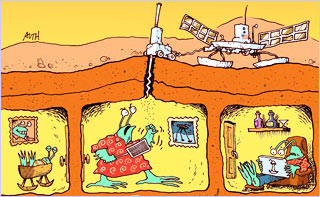 |
|
Related: - http://insight.jpl.nasa.gov/mission Artwork (may include photos, images, audio, and/or video): - http://www.bbc.co.uk/news/science-environment-19327286 - http://www.jpl.nasa.gov/news/news.php?release=2012-252 - http://www.newsworks.org/index.php/local//behind-the-lines... |
|
|
|
Did you know you can just pour milk over uncooked oatmeal and eat it like cereal? Yeah. You just put a little sugar in there (or a sugar substitute) and maybe some raisins or something. It's great. I love it. I learned about it in Germany, but I haven't met any Americans who have ever heard of it. Try it! (Don't buy the microwave oatmeal. Buy the regular oatmeal in a canister. It doesn't matter if you get regular or "quick.") |
|
 |
|
Artwork (may include photos, images, audio, and/or video): - http://newhopemills.com/product.php?product_id=39 |
|
|
|
I think one of the best places to start talking about anxiety is Comedy Central. There was a comedian (I wish I could remember his name) who said, "You're supposed to have some amount of anxiety. Anxiety makes sure you pay the electric bill." And it's true. Some amount of anxiety is normal. There are a lot of different ways of looking at anxiety within the spheres of psychology and biology. And there are huge corporations that recruit people with what they call "professional anxiety." Professional anxiety just means you worry a little more than most people. They want people who worry about which machine on the factory floor is due for service... This kind of anxiety is lumped into the category "generalized anxiety disorder." It can be treated in a variety of ways, but is usually more manageable than other forms of anxiety. Then you have more specific forms of anxiety, and more severe forms. These almost always require treatment, so if you think you're suffering from anxiety, it's important to talk to a professional so they can help you through it. I'll give you a cool little example about anxiety and a stressful situation. And, although this is an old-fashioned approach to psychology, this is about a dream. It's a dream that about half the people I knew in college all had (including me!). You're approaching the end of the semester, and suddenly realize you've forgotten to go to one of your classes. Somehow, in all the chaos, you just forgot you were in that class. And now you're screwed! For some reason, this dream is very common. And you'll probably be successful in life if you've ever had that kind of dream, because that's basically what companies are looking for... So, that's a quick tour of anxiety. Even if this describes your level of anxiety perfectly, you should still talk to a professional and at least find out more. If you're suffering from more specific or more severe anxiety, there are very effective treatments available. So go to the pros! (I'm, uhh, not a pro!) |
|
 |
|
||||||||
| This article got me thinking about debates in the U.S. over AmTrak... But this is a WAY bigger deal! The article talks about improving the British Rail System, and how privatization of trains in the U.K. has failed. Obviously, I agree with the article... Check it out! I know I'll be reading up on this! - http://falseeconomy.org.uk/blog/action-for-rail-our-privatised-rail... The U.S. doesn't take trains seriously enough, and like the Postal Service, the Republicans' goal with AmTrak is to see it fail, even though it isn't actually operated as they claim. We barely take highways seriously. If you're stuck in traffic, you're poor and stupid - "Cadillac lanes..." (which refers to a lane on a highway that you have to pay to use, while the other lanes are free). The British Rail System serves far more people (probably both in number and as a percentage of the population) than any train service in the U.S. Both the U.S. and U.K. show increased train ridership in recent years, and a growing frustration with automobile traffic. Everyone is looking at trains right now... But here are some numbers: The best comparable numbers I could get are from Wikipedia. Let's start by talking about train "passenger kilometers per head of population." I think this means that you take the total number of kilometers people travel by train each year, and spread that number out over the total population. The number does not include "metros" (city subways, local trains, etc.). In the U.K., there are 770 km of train travel per head of population. In the U.S., there are only 80 km of train travel per head of population. But there are other ways of looking at it. The U.S. does not qualify as a country with more than 500 million passengers served per year, while the U.K. does (so no comparable numbers are available for the U.S.). |
||||||||
 |
||||||||
| A high-speed train in London | ||||||||
When Americans look over there, we want to know how to get out of our traffic nightmare... So this is a big deal, in more ways than one. It's a big deal in the U.K., too... In the U.K., it sounds like they're talking about tolls to discourage excessive automobile travel. While there are tolls in the U.S., the situation is very different... I think I should just say we can't look at it that way... I don't think a lot of people understand how bad traffic is in the U.S... For the past several decades, the U.S. has been building HOV lanes (High Occupancy Vehicle lanes) to encourage people to ride to work together (or "carpool"). If you're caught in those lanes without a certain number of people in your car, you get a ticket. We've even had people caught with mannequins in their car... Then they opened the lanes to people with hybrids or electric cars... And now they're talking about also allowing people to pay a fee to use the lanes... WE NEED TRAINS! A Little Fun: Oh, hey! You like Cadillac lanes? How 'bout a G5? Playah... Umm... There's a song now... She's in the HOV lane (she says "hove")... |
||||||||
|
||||||||
Thought I'd throw in a little of this while I'm at it... |
||||||||
|
||||||||
Related: - http://falseeconomy.org.uk/blog/action-for-rail-our-privatised-rail... - http://en.wikipedia.org/wiki/Rail_usage_statistics_by_country - http://en.wikipedia.org/wiki/British_Rail - http://en.wikipedia.org/wiki/Amtrak - http://en.wikipedia.org/wiki/High-occupancy_vehicle_lane Artwork (may include photos, images, audio, and/or video): - http://londondays.org/london-is-the-focal-point-of-the-british-railway... - http://www.youtube.com/watch?v=A7lhzWI5Zyo - http://www.youtube.com/watch?v=XgE-Oedaiyk |
||||||||
|
||||||||
STEM stands for Science, Technology, Engineering, and Math. If you watched the landing of the Mars rover Curiosity, you might have caught NASA's presentation about STEM. So, here we go... All across the world, but especially in the U.K. and U.S., there's a concern about competency in STEM. The Mars rover, the Higgs boson, and other recent events have peaked the public's interest in topics related to STEM, and kids are out there eager to learn about this stuff... We need STEM to survive the 21st century. But people, especially kids, are being shut out when they show up eager to learn more about STEM. Nurturing this interest should be about whether or not you "get it." I'll give you an example using math. "Explain in your own words why multiplying the length of a rectangle by the width gives the area. In your own words, describe what 'area' means to you." That should be half the points on the test. (In some schools, it is...) Of course, we don't want kids who can't multiply... But "getting it" is a huge key to welcoming people into the STEM community. And too often, people get shut out by tests like, "who can do long division the fastest." Did your teacher ever ask you anything like what "area" means to you? Maybe that kid isn't the best at long division, but he or she might make a great computer programmer as long as they "get" what division is... So, does "50% more" mean double the original amount? Does the width of the tick marks on a ruler affect measurement? Are you excited about Mars and the Higgs? WELCOME! We're going to need your help! Hang in there with us while we get this going... |
||||||||
 |
||||||||
[Online, it appears this isn't taught until 5th grade. I think you could do it this way in 3rd grade and just not mention square feet. Like remainders were just mysterious things for a while...] Could you explain it? Here's how I'd do it... This rectangle is 5 feet long by 3 feet high. Today, instead of saying height, we're going to say "width." Imagine the rectangle is the floor of the cafeteria. It even has tiles! (There's a debate about whether to teach it as base times height, but the cafeteria wouldn't make sense that way...) Is everyone okay with that? Are there any questions so far? How many tiles do you think are on the floor of the cafeteria? No one? I don't know either, but I'm going to show you a quick way to find out without counting them all! In fact, if we divide our rectangle into tiles so that each tile is 1 foot (don't say square foot yet...), we can count the number of tiles to get the area. The area is just the total number of tiles inside a shape. Does everyone understand that? Raise your hand if you can tell me what area means? Good! We're counting the total number of tiles! Let's start by counting the bottom row. There are five tiles. And you can see there are 3 rows of 5 tiles, so we could just say 5+5+5 and figure out that there are 15 tiles. But who knows a faster way to add 5+5+5? Anyone? That's right! You can just multiply 5x3! So, if we count the tiles across the bottom, and multiply them by the number of tiles down the side, we get the area! Let's try it! 1, 2, 3, 4, 5 for the length, and 1, 2, 3 for the width. See how we counted the corner tile both times? That's because we're not counting the total number of tiles, we're just trying to figure out the length and width so we can multiply! Now let's multiply! 5x3=15! Good work! I bet if I gave you a rectangle without any tiles, and told you the length and width, you could figure out the area! How would you figure it out? Anyone? That's right! You multiply the length times the width! So, the area is the total number of tiles inside a shape, even if we don't draw the tiles. And length times width gives us the area because it's like a quick way to count all of the tiles. That's going to be a test question, so make sure to ask questions now if you have any. Does everyone understand area? Okay, I'm going to pass out an activity sheet now... By the way kids, later you'll learn that those little tiles are called "square feet." (Maybe you could just force them to write square feet without explaining it... which I hate...) |
||||||||
 |
||||||||
| It's that time of year! It's back-to-school time! | ||||||||
Artwork (may include photos, images, audio, and/or video): - http://www.dvd-ppt-slideshow.com/blog/back-to-school... |
||||||||
|
||||||||
Okay, I got something... A paradoxical object has to be mass-less. (I have to jump through a lot of Einstein here, for brevity, and say...) That would mean the universe would become conscious (or that consciousness would work in a way that breaks the rules I put in place). The rules I put in place to prevent this before are not verifiable, so under this scenario (which is very complicated) I bump up against the anthropic principle just like everyone else. So I need to stick another rule in there, and not enough information is available about the Higgs boson to do that at this point. It will work, though. And doing a half-assed job probably means it can be a one-liner. That's it. There ya go... Also, according to my own theory, the universe could become mass-less, and I'd need to add another dimension to solve that (along with the dimensions I have so far...) |
||||||||
|
||||||||
We just landed on Mars! (well, a week ago...). The craft is a car-sized robotic rover called Curiosity. Curiosity was designed to assess whether Mars ever had an environment able to support small life forms called microbes. In other words, its mission is to determine the planet's "habitability." To find out, the rover carries the biggest, most advanced suite of instruments for scientific studies ever sent to the martian surface. The rover will analyze samples scooped from the soil and drilled from rocks. The record of the planet's climate and geology is essentially "written in the rocks and soil" - in their formation, structure, and chemical composition. The rover's onboard laboratory will study rocks, soils, and the local geologic setting in order to detect chemical building blocks of life (e.g., forms of carbon) on Mars and will assess what the martian environment was like in the past. That's sort of a brief overview lifted from JPL's website. One of the tough things about writing these kind of posts is deciding what to put in, and what to leave out. Some people are curious about the amazing landing. Others might want to know more about the specific instruments onboard Curiosity. And what about the geography of Mars? Where is Gale Crater? You can read about all of this and more at JPL's Curiosity Mission page. So, check it out! Links: - NASA TV - NASA's Mission Page - JPL's Curiosity Home Page - JPL's Curiosity Mission Page |
||||||||
 |
||||||||
| Photo from inside Gale Crater taken by Curiosity | ||||||||
 |
||||||||
| Artist's concept of Curiosity inside Gale Crater | ||||||||
Artwork (may include photos, images, audio, and/or video): - http://mars.jpl.nasa.gov/msl/news/whatsnew/index.cfm?FuseAction... - http://mars.jpl.nasa.gov/msl/mission/overview |
||||||||
|
||||||||
[I don't even know what I want to do with this post, so I just left it... I will say that this is what a really rough draft can sometimes start out like... I'm not supposed to publish stuff like this...] The article on Digg from the Economist about beer and Silicon Valley and creativy. Creativity and insanity. The History Channel and agriculture was invented to produce beer and caused civilization. The temperance movement. The suburbs. The car. Google's self-driving Prius. Something is happening... Is this worth a post? It's something... There's something going on... |
||||||||
We need a song! Put on your favorite song tonight! I'll try and find something, too! |
||||||||
|
||||||||
|
||||||||
On Tuesday, August 7th, over 100 people in New York City representing Occupy Wall Street (initially organized by members of NYC Uncut), US Uncut, Dos Paises Una Voz (2 places one voice), Yo Soy 132 (Mexico's student movement), and other labor activists occupied Saks Fifth Avenue in protest of Carlos Slim, who has been designated "the 1% of the 1%." Slim is the world's richest man, the largest stakeholder in Saks Fifth Avenue, and has been accused of overcharging impoverished Mexicans by over $129 billion as owner of Mexico's largest phone company. What better way to protest predatory greed than by taking over his Fifth Avenue store? |
||||||||
 |
||||||||
Related: - http://usuncut.org/blog/occupy-saks - http://occupyamerica.crooksandliars.com/diane-sweet/occupy... Artwork (may include photos, images, audio, and/or video): - http://occupyamerica.crooksandliars.com/diane-sweet/occupy... |
||||||||
|
|
|||||||||||
|
|
[UPDATED: Jul. 26, 2012]: People - maybe some of them shy Republicans - want gun control on NewsKing. Whatever you think that means, or is worth, they're saying they want to do this here. Shit's crawling out of the fucking woodwork... Happy to create a space for working with Obama and the Democrats... Now let's do it for real! ------------ America is moving on from the shooting in Denver, Colorado. Sort of. The political ads are back on TV, and the political talking heads are on the news "debating" about a solution. We've got "going after individuals who 'fit the profile'" vs. "some form of gun control." This is actually pretty interesting. I think the gun control side finally has the "ammo" they need... Here's why: If you own a gun, you fit the profile. Because your mind "went there." And that's what the gun lobby is arguing. They're "going after the individual," because the shooter in Denver was a "loner." But what about gangs? Gang members aren't alone... So, once you start down this path, you just end up targeting gun owners. The gun lobby has targeted itself... shooting itself in the foot, so to speak... The best America can do at the moment is to talk about gun control. In other words, the best we can do is reduce the number of dead from 12 to 3 by changing the kind of gun you're allowed to own. It also sends a message that you shouldn't let your mind "go there." And about that... You realize we have tens of thousands of people in the military - or who were once in the military - who fantasize about "blowing shit up" all the time. Bad experience at the department store? Blow the fuckers up. Tired of waiting in traffic in the tunnel? Blow it up. And this is common bar talk... That's quite a large profile, and it doesn't even include what's going on in the civilian world... Gun toting tea partiers may be surprised to learn that the Republicans are more than happy to make this argument against individuals. Tea partiers don't exactly fit in with Mitt Romney and his wealthy friends. So, I've said it before and I'll say it again... We need gun control. And that's the best we can do right now... We all know America has a lot of problems that need fixing, and we're working on it... But just to ram it home one more time... gun control... |
|
 |
|
| It's
had your punchcard for over 100 years... If you don't give a little on gun control, it'll start calling the cops on you... And if you turn it off, Hitler will come back... There's only so much I can do... Gun control... |
|
Notes: - 1) My choice of the photo of that old computer (which made its debut on NewsKing HERE), along with the caption I wrote, was inspired by the 1951 film The Day the Earth Stood Still. The film was remade in 2008, but I remembered the speech at the end of the original 1951 film (available HERE, and linked below). Sort of related to the Joshua character in the 1983 film War Games, which you can watch HERE. Both films have themes related to the Cold War... You can read a little about the Cold War HERE (also on NewsKing)... Anyway, the scene at the end of the film is basically what I did with the photo and caption above (it's even in black and white!). The speech in the clip from the film isn't perfect ("any aggression" - give me a break!) but if you relate it to assault weapons (or nuclear war, which was what it was about) it works good enough... And the "hawks" at the Pentagon are already trying to relate what happened in Denver to nuclear war, and stir up the Iran thing. So be sure you understand the Joshua part from the movie War Games... And don't ban basketball... Or beer... have a beer here... And go see a movie! Kinda funny that Gort (the robot) was already in place in 1951... Hopefully you get all this... - Final scene from The Day the Earth Stood Still (1951) - 2) Fun followup on Note 1 above: "Well, I want a loud muffler. That's my aggression! What about that? And I want a big bad truck! How's that for aggression?" Well, you know I'm not gonna "go there" with you. I can tell you I'm serious about gun control. And there'll be a new post soon with a totally different topic... The Olympics start tomorrow... Let's have a beer and watch the opening ceremonies... |
|
|
|
So, for two days now I've been hearing about the Boy Scouts. Boy Scouts is sort of like a club where young men learn about camping, working together, skills like tying knots... that sort of thing... You guys know I'm an Eagle Scout, right? I hold the highest "rank" you can have in Boy Scouts of America... Is there something about gayness and the military now? (Boy Scouts has "ranks" and "badges" and all of that... a lot like the military. I hesitate to call it "paramilitary." But the military accepts gays and Boy Scouts of America does not...) Let me start by telling you about being a Boy Scout. Basically, your parents are looking for a fantasy. I don't mean that in a bad way, either. You're whatever they envision a "young man" to be. And Boy Scouts is supposed to do that for you. Anyone who has been "behind the scenes" in scouting knows how hard everyone works to pull it off. But I have to admit there are some fractures that need work... If you want to address these issues with Boy Scouts of America, you have to start with the scouting fantasy... We all stand naked in the woods in front of each other... So, yes, I think Boy Scouts of America should reconsider its policy on homosexuality... and not think too deeply about it. Do I want to give up my rank? No. I'd rather stick around and help those crazy parents into the 21st century... (And now you know you have an Eagle Scout doing this... THIS!) |
|

|
|
Of Interest: - "Who was supposed to bring the index cards for tonight's ceremony?" Blank stares. "Okay, I'm gonna have to jump up on stage and wing it for all the parents. You guys just stand behind me, okay? All you have to do is stand there. It'll be fine..." - Wilderness Survival: "There's an interstate on one side of the park, and a big highway with a 7-11 on the other side... Okay, okay, I'll play along..." Remember? (I got Eagle, too!) Related: - http://sports.yahoo.com/news/major-league-soccer-not-renew-204000549... - http://www.washingtonpost.com/national/apnewsbreak-after-2-year-review... Artwork (may include photos, images, audio, and/or video): - http://americajanespeaks.net/2010/06/be-prepared-getting-your-son-ready... |
|
|
|
There's a lot I want to say about what happened in a suburb of Denver, Colorado known as Aurora. But I feel like I've already said it. So, I just want to extend my condolences to the families and friends of the victims of the July 20, 2012 mass shooting, suspected to have been carried out by James Eagan Holmes. 12 people were killed, and 58 people were injured, bringing the total number of victims to 70 - the largest number of casualties of any shooting in U.S. history... Officials are investigating what happened, and we will get to the bottom of it. We're doing everything we can to ensure people's safety, and move past this terrible tragedy... |
|
|
|
This is a chance for me to talk about living in Germany. Nürburgring is a famous racetrack in a part of Germany known as the Rhineland. As in the Rhine river. The city of Cologne (Köln) is the largest city in the Rhineland, and it is neighbored by the city of Bonn, which was the capital of West Germany during the Cold War. Anyway, the article below doesn't really tell you about Nürburgring. On days when there are no races, you can take your car or motorcycle out to Nürburgring and pay a fee to race around, and you can go as fast as you want. I think only dirt amateur tracks in the U.S. allow this, but Nürburgring is far from amateur. It's a pro racetrack, and safety is a priority. Most people don't know this, but nowadays most of the German Autobahn has speed limits. There are only small sections remaining where there are no speed limits, and even then, it's not like you can just go wide open and race other motorists... You want Nürburgring! I've never had an experience comparable to Nürburgring in my life. Nürburgring is where I learned that motorcycles are faster than cars. They have a really cool museum, too. So, pressure them to keep Nürburgring open! Read the article below and take action! |
|
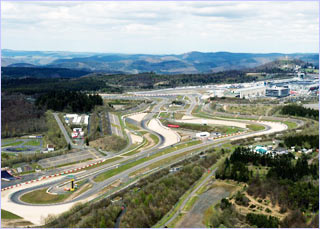
|
|
Related: - http://www.spiegel.de/international/business/world-famous-nuerburgring... Artwork (may include photos, images, audio, and/or video): - http://www.spiegel.de/international/business/world-famous-nuerburgring... |
|
|
|
[UPDATED: Jul. 19, 2012] Nate is 11 years old. He lives with his grandmother. "I've been lovin' my grandma all my life... if I didn't love my grandma, I'd be in foster care..." Nate and his grandma are moving today, and the truck they borrowed has overheated due to the heat wave. They're moving about 50 miles away from where they used to live, and have about 30 miles left. They pull into my motel to let the truck cool off. I'm outside pumping up my bicycle tires before I go riding. Nate sees me outside and walks over and introduces himself. He looks like a soccer player or something. And he has a face like a movie star. Nate and I get to talking, and this kid is the embodiment of everything I feared would go wrong. Turns out he doesn't play soccer. Or any sport. He can't even ride a skateboard. He plays the video game Call of Duty all day. He's wearing a hat with his favorite football team on it, but he doesn't watch football or any sport. "If I don't take my ADHD medicine, then I start to eat..." He lifts up his shirt to show me what he's got... He's in great shape... Nate does own a bicycle. So, that probably helps more than he knows. But right now he wants to buy a bullet proof vest and a gun. "And I want to beat someone up, too," he says. A lot of this is normal, but Nate continues... "And I want to join the Army. They'll give me a bullet proof vest and a gun." Maybe a normal childhood fantasy, especially considering the whole Call of Duty thing. But then, "There'll always be a war!" Turns out Nate doesn't have any friends, and is always getting in trouble. I asked him what 8x5 was. He didn't know. We worked it out from 5x5. This dude's 11 years old! "You have to beat people up and tell them what to do!" he says. I tell him, "Nate, you need to calm down when you get to your new school and try to make friends. Do you see people walking around in bullet proof vests with guns? Do you see any fights?" He's sizing me up. I lift up my shirt, then roll up my shirt sleeve and flex my arm. It worked. "Put your hands behind your back like you're in handcuffs, Nate," I say. Then I make a gun with my hand and put it to his head. "What's 8x5?" I ask. "That's the real world, Nate!" I shout. His grandma chimes in, "His imagination is ruined!" I can't leave it like this. I show him my underground handshake (which is out of date), and he seems to like it. "There's nothing wrong with being tough, Nate, but you have to be smart," I tell him. Then I take off on my bike. When I get back, they're gone... |
|
 |
|
| Meet
Nate... (in about 5 years...) He's learned to multiply... and he's beat up a few people... |
|
|
|
Scientists at CERN, the European physics lab that just opened the world's largest particle accelerator, have announced the strongest evidence to date for the existence of the long sought "God particle." Everyone is really excited about it, and the entire world is celebrating. But does the "God particle" mean that God does not exist? What's in a name? Another name for the "God particle" has been the Higgs boson. One scientist nicknamed it the "God particle" during an interview, and the name stuck. The scientist only meant that the particle was a "big deal." Think of it this way: sometimes people refer to a powerful corporation as "God Corp." All they mean is that the corporation is a "big deal." That's all the nickname "God particle" means. This is an exciting time for the physics community, and a lot of interesting debates and theories are sure to be a part of this celebration. I'm excited about writing more on this topic in the coming months. But if you're not into physics, you can still join the celebration! Civilization has pulled off something important, and we're sure to gain a deeper understanding of the universe, and generate new technologies everyone can enjoy. The future looks brighter thanks to this! Congratulations everyone! |
|
 |
|
| This is a celebratory beer made by a brewer in Montreal, Canada... | |
Artwork (may include photos, images, audio, and/or video): - http://cosmiclog.msnbc.msn.com/_news/2012/07/05/12585302-lighter-side... |
|
|
|
The healthcare monster is dead. The U.S. Supreme Court has voted to uphold Obamacare. A scourge has been lifted from the Earth. That mean, old, creepy part of America that took advantage of the sick is now dead. And it's important to America and important to the world. The whole mood of the planet has changed. We care more about one another. America is less of a voice for cruelty and evil, and more of a voice for fairness and justice. We - all of us - have a leg to stand on now... But there are still problems, and still battles to fight. Evil doers are still trying to put the past in front of us instead of putting it behind us. There are people who want to try and undo it. We must remain vigilant on healthcare for all, along with food, shelter, education, and the rest of the safety net. Part of remaining vigilant involves addressing the Supreme Court's ruling on the Medicaid portion of America's new healthcare law. Medicaid is a government program that has been expanded to provide free healthcare for all low-income Americans. But the court has said that it will be up to the states as to whether or not free healthcare is offered to low-income individuals. For the first few years of the expansion, the U.S. government has offered to pay 100% of the costs of expanding Medicaid to any state that participates in the expansion. After that, the U.S. government will pay up to 90% of the costs. But some states don't want to participate. So this battle will rage on, and we have to fight... In states that choose not to participate, the government will pay up to 98% of the costs of private health insurance for low-income people who choose to purchase health insurance through a new "healthcare exchange." But individuals will have to pay 2% or more out-of-pocket (there are a lot of variables), and they have to sign up for health insurance and pay a monthly bill whether they are sick or not. This will not be as effective as Medicaid for the unemployed, homeless, and those living in deep poverty, whether or not they have a job. So, there is still a little potential cruelty there, depending on the state you live in. We must fight for the expansion of Medicaid in every state, and help citizens realize the benefits of free healthcare. This is about healthcare for all. People over the age of 65, the disabled, military veterans, and children all have a number of programs that offer free healthcare in various ways to Americans. So, Americans are getting closer. But we must continue to fight until everyone is covered. The monster is dead, but we have to kill the boogeyman! Congratulations to Obama and the Democrats, and thank you to the Supreme Court! |
|
 |
|
| Click HERE to try out the app! |
|
|
[UPDATED: Jun. 14, 2012] This is a "stand your ground" shooting incident from two years ago. A video of the incident was released June 6th for the murder trial currently under way. The shooting took place in Houston, Texas, America's 4th largest city. The case caught my attention on CNN. As broadcast on CNN, there is a point in the original video where the shooter actually says, "I'm standing my ground," but that part was cut out of the video below. However, the video below is subtitled and is also the longest portion of the original video I could find... UPDATE: The shooter was convicted of murder on June 13th, 2012... |
|
 |
|
| Click the play button above to start the video. | |
Related: - http://www.khou.com/home/Retired-firefighter-accused-of-killing-teacher... - http://www.latimes.com/news/nation/nationnow/la-na-nn-texas-standground... See Also: - Lawlessness & The Murder of Trayvon Martin Artwork (may include photos, images, audio, and/or video): - http://www.khou.com/home/Retired-firefighter-accused-of-killing-teacher... |
|
|
|
The opportunity to write a post like this comes along once in a blue moon... or a blue asteroid... So, I'm thrilled to announce the startup of Planetary Resources, Inc. - a company with the exciting goal of mining asteroids! The company is backed by Google's Larry Page and Eric Schmidt, and filmmaker James Cameron, among a list of others. This is how big things get started. As we work towards taking paying passengers to space and to the International Space Station, and work on getting to Mars, the kind of work Planetary Resources is doing is an important part of the journey. Planetary Resources is working on mining gold and platinum from asteroids, along with other materials important to us Earthlings. They also have plans to make rocket fuel from from asteroids, essentially setting up "gas stations" in space (which also means hydrogen and oxygen could be produced for a number of purposes). Fill 'er up! |
|
 |
|
An asteroid is a chunk of rock drifting in space. It's different from a comet because a comet is a flying chunk of ice. A meteoroid is a tiny piece of an asteroid or comet that breaks off. In case you were wondering... In any case, Planetary Resources is exploring a variety of technologies to mine asteroids. While some of these technologies are in the initial phases, many of them are almost ready, and we should see some early attempts in the next few years. Check out the video below! |
|
 |
|
| Click the play button above to start the video. | |
The project has stirred a great deal of interest and attracted a lot of talent. They've been hit with tons of applications and have already hired lots of people, and they're summer intern program is full! Projects like these are the future. Whether looking for gold on an unexplored asteroid or looking for it in the wilderness of the western U.S. back in the 19th century, it takes vision and a sense of adventure to get it done. And it changes the world. Soon space won't be a wilderness, and Planetary Resources is doing its part to help set up the fuel and other resources needed to get it done! Congratulations to Planetary Resources! |
|
 |
|
 |
|
Related: - http://www.planetaryresources.com - http://www.theatlantic.com/technology/archive/2012/05/robots... - http://www.wired.com/wiredscience/2012/04/planetary-resources... - http://www.huffingtonpost.com/2012/05/16/asteroid-mining-robots... - http://en.wikipedia.org/wiki/Asteroid_mining Artwork (may include photos, images, audio, and/or video): - http://www.wired.com/wiredscience/2012/04/planetary-resources... - http://www.huffingtonpost.com/2012/05/16/asteroid-mining-robots... - http://www.wired.com/wiredscience/2012/04/planetary-resources... - http://www.planetaryresources.com |
|
||||
Recently, I did a post on Hampton Roads, Virginia, but I wanted to add this to it because I don't think I quite captured it for everyone. These are some photos taken within a one mile radius of part of a sprawling suburb where scenes like this go unnoticed unless you know about them. And you can find scenes like this throughout Hampton Roads. At the end of a cul-de-sac, and all along the coastlines... You're sure to discover something! |
||||
 |
||||
This is a tombstone from 1686. It happens to have ended up in the front yard of a modern, suburban home. As best I can tell, the neighborhood was a pear orchard in the 17th century, and the tombstones (there are three) sat forgotten for hundreds of years until construction began on an extended section of the neighborhood. You're looking at the grave site of a British family who helped colonize a New World. Probably more common to see this sort of thing in a place like Europe, but something unique in the U.S... |
||||
 |
||||
This is a house-boat docked at the end of a cul-de-sac. Don't see many houseboats anymore, but they're still around if you know where to look. This one is in an obscure part of a river system full of beautiful wetlands. The wetlands, which you can see in almost every photo, are part of the Chesapeake Bay watershed, and are protected. Hampton Roads is surrounded by wetlands like this, in every single city... |
||||
 |
||||
Farms are not that common in the suburbs, but this one has been here so long the neighborhood just sort of went up around it. They have cows, horses, goats, and chickens. And they're all just roaming around. Nowadays, the homeowners take in horses for "retirement," and they're allowed to just graze in peace for the rest of their lives... |
||||
 |
||||
I thought this would have a better view of the massive wetlands, but the view in the photo ain't so bad! This is a nearby public boat ramp and nature park. There are trails through the wetlands behind where I'm standing, and the pier extends from the boat ramp. On summer weekends, it's packed! A lot of people around here own boats, and some people even have docks built onto their property... I hope this gives you a little bit better look at Hampton Roads. You can see scenes like this everywhere... from the Colonial Parkway to Sandbridge... So be sure to check out the cul-de-sacs and coastlines. You never know what you'll find! |
||||
|
||||
Every summer is different. This year, Virginia Beach is gearing up for a summer like no other. So, let those wintertime blues fade away, and come enjoy the summer sun this year! And plan on a bright future, because projects are in the works that are transforming the entire Hampton Roads community. Traffic jams that get started in places like Washington, DC; Richmond; and Raleigh, NC will be alleviated by a new tunnel to Norfolk, along with train service to Petersburg, opening up the entire area for both tourists and commuters. And the TIDE train service may be extended from Norfolk to Virginia Beach. There are also new attractions opening everywhere - from Williamsburg to Nags Head - but try out the new train (many Americans have never ridden a train). The TIDE is the only light rail service in the state of Virginia. And Virginia is for lovers, so be sure to come check this place out! |
||||
 |
||||
| Hampton Roads, Virginia | ||||
Hampton Roads is also working on a CSA (Combined Statistical Area) with an additional portion of North Carolina, which will bring even more shopping opportunities in addition to the great outlet bargains and luxury stores now serving the entire world! There are two other pending CSA's for Hampton Roads that will join the area with the largest megalopolis in the U.S. The Boston-NYC-Philly-DC megalopolis. I thought the NC CSA would help with that. CSA's and MSA's (Metropolitan Statistical Areas) help decide which companies build shops in a particular area, and which areas are thought to be an economic relationship. Hampton Roads would like to say, "WELCOME EVERYONE!" The Hampton Roads community would also like to take a moment - on behalf of everyone in the United States - to welcome home the military. Welcome home! |
||||
 |
||||
Whether you can make it to Hampton Roads this summer or not, you can enjoy a song by a local Hampton Roads band! This is "Switzerland" by the band The Last Bison. Click the play button below! |
||||
 |
||||
| The
Last Bison - Switzerland Click the play button above to start the song. |
||||
A common way of looking at the cities and counties of Hampton Roads: Camden Co. (NC), Chesapeake, Currituck Co. (NC), Gates Co. (NC), Gloucester Co., Hampton, Hertford Co. (NC), Isle of Wight Co., James City Co., Mathews Co., Newport News, Norfolk, Northampton Co., Pasquotank Co. (NC), Poquoson, Portsmouth, Southampton Co., Suffolk, Surry Co., Virginia Beach, Williamsburg, York Co. |
||||
|
||||
[UPDATED: May 2, 2012] So, I'm on my morning bicycle ride, and as I pass by my designated voting location, I notice signs for a local election. I pull in to vote... Of course, since I'm on a bicycle, I don't have an ID. No problem. I know the law and know they'll have the form for me to sign. They ask for my ID, and I say I don't have one. They tell me to return to vote later with an ID. That means they just broke the law. A BIG law. My state has a law in the works that changes the current process, but even under the new law, you will still be able to vote without an ID. It's important to mention that you will still be able to vote without an ID in this state, because election workers in this state are trying to ban voters based on "ID rumors" now. Even under the new law, what they did was illegal. Just the suggestion of voter ID's on Fox News was enough for them to try and screw me out my right to vote. This is the second time this has happened to me when I went to vote without an ID. Out of 4 people checking in voters, none of them were aware of the existing law or the new law. Someone - and I don't know who - came over and informed the people checking in voters of the existing law only after I ARGUED my case with 2 of the 4 people. Not everyone is up to an argument like that, and I think that's the idea. Most people would comply and leave without voting. (Not me, of course!) I want to be clear here, and say that 4 people were asked about the law, and 2 people were debated. I also want to say that the last time this happened, it was a Republican who lives nearby with whom I engaged in debate, and that our "voting area" is heavily Republican (though our city is Democratic). My point here is that just the rumor of "voter ID laws" has favored the Republicans. If it were the presidential election, it could have been a lost vote for Obama. Just rumor of ID's, not law, is behind this. And who knows what's going in the other states? One of the most twisted parts about these new "voter ID laws" is that the problem they are supposed to solve is entirely created. Statistically, alleged "voter fraud" is near zero. The laws have been crafted by Republicans to deny the right to vote to people who don't have ID's, and in most places where these laws are going into effect, these folks are mostly Democrats. I'll close by saying that all of the talk about Jim Crow is correct. They tried to deny the Democrat... |
||||
 |
||||
Artwork (may include photos, images, audio, and/or video): - http://www.mainstreetoshkosh.com |
||||
|
||||
|
||||
 |
||||
| STOP CISPA! CLICK HERE! | ||||
Related: - http://cyberspying.eff.org - http://en.wikipedia.org/wiki/Cyber_Intelligence_Sharing_and_Protection_Act Artwork (may include photos, images, audio, and/or video): - http://cyberspying.eff.org |
||||
|
||||
A number of video game manufacturers are scamming consumers. The scams go unrecognized because few people in power understand what is going on. Some manufacturers are giving the impression that the retail price of a video game delivers a complete, playable product, but they frequently charge consumers extra to simply install a game after a certain date, or to use all of a game's features. In addition, gameplay is often restricted in ways comparable to prohibiting someone from changing the paint color of a car they purchased. Let's start with DRM. Some video game manufacturers use DRM (which stands for "Digital Rights Management") to double-charge consumers. For example, if you get a bunch of games for Christmas and you don't install all of them right away (or if you're just not that excited about some of them), DRM can be used to make you to buy a new "license" because you waited too long to install a game. So, even though a game has been purchased at the retail price, they want more money just so you can install it. And a game often can't be returned after it is opened, or after a certain period of time. |
||||
 |
||||
| Libraries, among other organizations, are against DRM. | ||||
Then there's DLC. DLC stands for "Downloadable Content," and it's become a scam. For example, you may begin playing a game and get to a certain point in gameplay where you cannot advance without paying an additional fee (which ruins the game for consumers). And if your game is played with other players online, additional fees may be charged just to remain competitive with other players, essentially rendering the game useless without paying additional fees. |
||||
 |
||||
| DLC can render a game useless. | ||||
These video game industry practices are not made clear to consumers when they purchase games, and such practices have not been a part of the video game industry in the recent past, confusing even the most experienced gamers. Video game manufacturers do offer something called an EULA (or a yoo-la), which stands for "End User License Agreement," but none of these scams are explained (DLC/Downloadable Content, for example, is just brushed off in some EULA's; they may only say, "downloads may be required," without mentioning fees and without mentioning the fact that a game may not be truly playable even after paying the retail price.) To make matters worse, some video game manufacturers claim that consumers are consenting to a EULA merely by opening a video game package. But some EULA's go even further than DRM or DLC... The name "End User License Agreement" is intended to imply that consumers cannot modify a game. Even though they have purchased a game at the retail price, they are not allowed, for example, to change the colors of the clothing on game characters. This is why I say it is like purchasing a car and not being able to paint it. A large part of the entire software industry - not just video game manufacturers - has been using EULA's to suggest that software is not owned by consumers, but merely "licensed." To most citizens in a capitalist society, ownership is assumed after making a purchase, and EULA's confuse consumers about this issue. Charging additional DRM/install fees and DLC/download fees make EULA's even more suspicious. |
||||
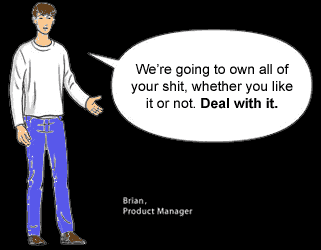 |
||||
| EULA's are sometimes used to take away consumers' rights. | ||||
There is now an increasing interest in "independent gaming." These are games produced by groups and individuals using video game design software similar to what is used by large video game manufacturers. I've personally reviewed five of these video game design software packages, and some of them are simple enough to be used by anyone with a "knack" for video game design. I've also reviewed several "indie games," and found their quality to be comparable to that of games produced by large video game manufacturers. It is important to build interest in independent gaming, because many consumers who are frustrated with the current gaming scene simply don't know that there are unadvertised independent games available. I support independent gaming. I also support standing up to the video game industry, and letting them know they can't scam consumers! |
||||
 |
||||
| Steam supports over 200 indie games and growing... | ||||
Artwork (may include photos, images, audio, and/or video): - http://www.defectivebydesign.org/node - http://4chancup.wikidot.com/v - Artwork Re-purposed (article turned out to be a typo, but we're on top of this stuff...) - http://www.indiegamemag.com/steam-to-be-more-indie-friendly... |
||||
|
||||
HTML is the core computing language of the World Wide Web. It stands for "Hyper-Text Markup Language." Basically, HTML provides instructions to applications like browsers on how to arrange a Web page so that, say, "that picture of the kitten goes on the left." If you've ever posted something on the Internet on a site like Facebook (for example), the HTML code stays "behind the scenes" and you typically don't see it. Want to see what it looks like? There is a short sample of HTML below, followed by a screen-capture image of the Web page the code produces: |
||||
|
||||
As the Web has grown and changed, HTML has grown and changed with it. Nowadays, HTML provides instructions to applications that bring increased functionality to the Web, but getting that Web page out to you remains at the core of HTML. HTML5 is the latest version of HTML, and it's being created even as I post this. It introduces new features to improve your Web experience and ensure that all parts of the Web - old, new, and cutting edge - will work better for everyone. A very important Internet organization known as W3C, or the World Wide Web Consortium, publishes HTML5, and they are holding a conference in Lyon, France all this week, from April 16-20, 2012 (Monday - Friday). W3C invites developers, business, government, media, analysts, and all who attend the 2012 World Wide Web Conference to participate in the expanding W3C Track and learn how the Open Web Platform is transforming industry and society. W3C's activities at the conference this year, from 16-20 April at the Lyon Convention Center in France, include: - Tim Berners-Lee Keynote (and participation in Workshops and a Panel) - W3C Tutorial Track (NEW!), four half-day presentations on CSS3 in Style, Accessibility in Tomorrow's Web, Developing Mobile Web Applications, Open Data in Practice - W3C Track: Camp-style half-day interactive discussions with W3C experts and Web users on Web Security and Privacy, and HTML5 Games A number of W3C staff will be on hand to discuss HTML5, CSS, and other technologies of the Open Web Platform. Attendees can also learn about W3C online training and participation in W3C Community Groups, and meet representatives of the new W3C France Office. The France Office and Inria will have a booth (number 54) in the exhibition area at the Lyon Convention Center. Read the full press release for details and see you in Lyon! |
||||
 |
||||
Related: - http://www.w3.org - http://www2012.org - http://www.w3.org/News/2012#entry-9404 Artwork (may include photos, images, audio, and/or video): - http://www.w3.org/html/logo |
||||
|
||||
[UPDATED: Apr. 14, 2012] I'm writing this post immediately after (or on top of...) the post below entitled Computers!, and the two posts kind of go together. This post is about violent video games. I entitled this post "WarGames!" in reference to the 1983 film WarGames, which has themes related to the topic of violent video games. When I have conversations with people about this topic, I often like to start off talking about old Road Runner cartoons from the 1950's. There are scholars who look back at these cartoons and argue that the cartoons are an expression of the psychological effects of war on American culture - characters used explosives, bombs, and falling anvils as humor. It was probably "unconscious" on the part of the cartoon's creators, which makes the argument that much more fascinating. But bringing up Road Runner also brings up violence in the media, which is a different - though related - topic. I'm going to try and keep the conversation about violent video games, but since violent media is a part of our culture, it is important to bring it up. |
||||
 |
||||
| A still-frame from a Road Runner cartoon | ||||
The first commercially available computers came out after WWII, around the same time as the old Road Runner cartoons. The plot of the movie WarGames centers around the idea of computers used by the military to play "war games," in an attempt by the military to find the best strategy for winning a nuclear war with the Soviet Union (the Soviet Union was dissolved in 1991, but much of it was made up of the country we today call Russia). The U.S. and its allies had a tense relationship with the USSR (USSR is another name for the Soviet Union) from the late 1940's through the early 1990's which has been called the "Cold War," although tensions began to relax in the mid 1980's. It was called the Cold War because things didn't get "hot," and war between the two countries never broke out, although the Vietnam War was in some ways an expression of Cold War tensions - the USSR backed one side, and the U.S. backed the other, even though the USSR and U.S. never fought directly. |
||||
 |
||||
| The video game Tetris was created in the former Soviet Union. | ||||
In very simple terms, the U.S. and USSR had thousands and thousands of nuclear weapons "pointed at" one another. In the 1950's and 60's, school children in the U.S. had to practice hiding under their desks whenever a war siren sounded, signaling a nuclear attack. Schools themselves were built as "fallout shelters," which meant that in certain parts of the building, nuclear radiation would not be able to hurt people. (When you hear the healthcare battle in the U.S. framed in terms of "socialism," it is an attempt to stir up the fears that were instilled in children of this era. The Soviets were everywhere back then - hiding in the bushes outside of schools trying to get white kids and black kids to play together on the playground... sound the alarm!) Although I entered school long after the practice of "nuclear drills" had been stopped, I remember seeing the signs in certain parts of my elementary school indicating fallout areas. When I asked about the signs, I didn't get a very clear answer. I heard it might be something about "atom" bombs and armageddon. Luckily, my school had "Armageddon Safe Zones." But clearly, something was wrong with the world - something big - and no one was talking... |
||||
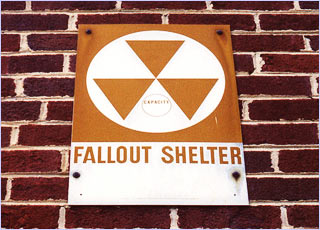 |
||||
| Sign indicating a fallout shelter | ||||
It is in this environment that the movie WarGames takes place. One of the scenes in the movie focuses on the "kill ratios" of an early video game called Galaga (which was a real game in 1983), and the theme is picked up again later when the "war games" played by the military's super-computer (called WOPR in the movie) displays kill ratios as it plays a game called Global Thermonuclear War. So, we see a link being made between violent video games and the military, and we have cultural links going back to Road Runner cartoons and computers from WWII. The first video game popular with the American public was called Pong, which came out in 1972, and it resembled table tennis (1). But by the early 1980's, video games had taken off, spawning home gaming systems and "video arcades," which allowed the public to play video games for a small fee. Many of these games (like Galaga) involved "shooting" at an enemy. In 1961, as President Eisenhower prepared to leave office, he warned Americans about the rise of the "military industrial complex." But the military, along with politicians who disagreed with Eisenhower, were busy freaking out school children (as well as the rest of the country). So, we begin to get a taste of the culture of the military industrial complex - it's all about fear. |
||||
 |
||||
| Selections from Eisenhower's "Military Industrial Complex" Speech | ||||
| Click the play button above to start the video. | ||||
By the turn of the century, the U.S. was again at war. It was defined as a never ending war against "terror." And the language of this war was not all that different than the Cold War. Video games like Galaga from the 1980's didn't scare people at all. The Cold War did that. But by 2001, video games had become a lot scarier, and a lot more real. The culture of war violence was apparent. And America had built a war culture for itself thanks to the 40-year-long Cold War and the military industrial complex. But the idealized America of the previous era was gone by 2001. In its place, a trash-talking military was left over. Today's military will tell you openly, "We have to train people who have no desire to kill to kill. We have to get them to pull the trigger even when they are looking in the enemy's eyes and those eyes seem to be begging for mercy..." That quote, believe it or not, is from a military spokesperson interviewed on the Discovery Channel. The movie WarGames talks about it a little with "turning the key" (to launch nuclear weapons), but today's military trash-talking is much more violent and forthright. Today's violent video games aid the military in their mission of building a society that "pulls the trigger," and segments of the video game industry have been corrupted by the military's mission. Some game makers even ship free games to members of the military. There's another movie, too, called Toys (1992) that shows a room filled with kids playing violent military-themed video games. In the 2000's, I read that the Army has actually set up "gaming centers" where kids can play violent military-themed video games for free - just like going to the library. |
||||
 |
||||
| A scene from a violent military-themed video game | ||||
The military's culture of fear and violence appeals to another cultural strain in America called vigilantism. Vigilantes are people who take the law into their own hands, or ignore the law, or are simply at war with everyone all the time. America has no "absolute bottom" or "safety net." When the military's culture of fear and violence combines with vigilantism, the two cultures produce an America awash in guns, with citizens afraid of one another. I just read an article in the Guardian about Trayvon Martin and America's vigilante culture that talks a bit about this. In some ways, we can see all of this play out on the Internet, especially on social media sites like YouTube. Some YouTube videos are a lot like the old Road Runner cartoons, with gun violence (including references to violent video games), and lots of trash-talking. It may be an "unconscious" expression of America's violent, militaristic, vigilante culture. Nevertheless, Americans have guns "pointed at" one another, and they frequently "pull the trigger" on the innocent. And they start wars, because that's all they know. Americans even have organizations dedicated to spreading that culture... Who is the strongest warrior? The one who gets sick and needs a doctor or a handout? You could just re-translate that into an economic argument, and you've got what's being spread to Britain. So, while you're worried about being the strongest or smartest, the wealthiest are spreading this crap and letting people kill one another - either with guns or disease - for their own amusement. It's entertainment, right? Somehow, those violent video games got onto computers. And it is a shame. My goal in posting this is to try and roll back that culture in America and highlight some of the more positive aspects of American life, as well as to stop the spread of America's violent culture - economically or otherwise - to other parts of the world. There's a whole other America, and it's much older and stronger than the military industrial complex. Young adults today are not just screwed up "war children" playing violent video games before going off to war, they are human beings who deserve better... And we all know it, somehow... Watch WarGames below! |
||||
 |
||||
| WarGames | ||||
| Click the play button above to start the video. | ||||
Notes: - 1) If you read the post below this one entitled Computers!, there is at least a slight chance that you may be wondering if Pong required a "mainframe." It could be played on a mainframe, but early home video gaming systems (1972-1976) weren't full-blown "computers," and between the "mainframe" and "micro-computer" (or "PC-sized computer") there was the "mini-computer," which was small enough to fit inside an arcade-sized video game. The way they built arcade video games, and the history of the micro-processor, makes it hard to get a handle on this. Related: - http://www.apa.org/science/about/psa/2003/10/anderson.aspx - http://www.guardian.co.uk/technology/2012/mar/18/video-games-propaganda... - http://mancunianmatters.co.uk/content/06042956-video-games-are-making... - http://www.telegraph.co.uk/education/educationnews/9183385/Violent-video... - http://en.wikipedia.org/wiki/WarGames - http://en.wikipedia.org/wiki/Able_Archer_83 - http://en.wikipedia.org/wiki/Wile_E._Coyote_and_Road_Runner - http://en.wikipedia.org/wiki/Soviet_Union - http://en.wikipedia.org/wiki/Cold_War - http://en.wikipedia.org/wiki/Vietnam_War - http://en.wikipedia.org/wiki/Tetris - http://en.wikipedia.org/wiki/Pong - http://en.wikipedia.org/wiki/Video_game - http://en.wikipedia.org/wiki/Galaga - http://en.wikipedia.org/wiki/Dwight_D._Eisenhower - http://en.wikipedia.org/wiki/Military%E2%80%93industrial_complex - http://en.wikipedia.org/wiki/Toys_%28film%29 - http://www.guardian.co.uk/commentisfree/cifamerica/2012/apr/07/trayvon-martin... See Also: - Computers! Artwork (may include photos, images, audio, and/or video): - http://www.brownblogfilms.com/news/bugs-bunny-on-broadway - http://supergametheory.com/2011/12/27/tetris-and-the-fall-of-the... - http://www.flickr.com/photos/andrew-turnbull/3478216208 - http://www.youtube.com/watch?v=8y06NSBBRtY - http://compactiongames.about.com/od/screenshots/ig/Modern... - http://www.imdb.com/title/tt0086567/fullcredits |
|
||
| [UPDATED: Nov. 14, 2013] Do you hate long division? Most people do. In fact, the only reason we have computers and the Internet and YouTube and Twitter is because humans suck at long division. We suck so bad at it we had to invent the computer to do it for us. This is a brief history of computing. ----- COMPUTERS! ----- Like everything in history, the development of the computer is a patchwork going back thousands of years. The story is full of people - and societies - who didn't know what other people and societies had done, or were doing, or even what their contemporaries were working on. The story is full of weird dead ends and ideas that almost made it. And there's a "corporate asshole" character I'm developing who was born in the 1950's and made it into upper management in 1980's and still works there. We'll meet that person later... So... it wasn't until the 1940's that scholars bothered to look back in time and think about how to build the modern, binary computer. Let's look back in time now... First, there was long division. It gave us things like temples and cathedrals and skyscrapers that didn't fall down. It gave us a way to sail across oceans using the stars and a compass to navigate. It gave us trains and planes and automobiles. But long division was really friggin' hard, and even the smartest people in the world made mistakes. Eventually, the world got so darn complicated we needed people called "computers" to sit in a room and "compute" for us. The first "computers" were people. They were responsible for things like making sure buildings didn't fall down, making sense out of census data, figuring out who owed money to the bank, and, of course, plotting a course across oceans. When these "computers" messed up, stuff went wrong. So, tools were developed to help them. There was the abacus and the slide rule, and all sorts of math "tables." (Those tables had no legs, though!) But the modern computer was cobbled together from more than just that stuff! |
||
 |
||
| An abacus (left) and a slide rule (right) | ||
Then there was the punch card which, in the context of computing, was like an early DVD or hard drive. But it was first developed for looms (which sewed intricate patterns for fabrics), and the loom people never talked to the railroad people, who started "punching tickets" to keep customers from trying to take a longer train ride than they paid for. Don't worry, some smarty pants is eventually going to put all this together, but not yet! |
||
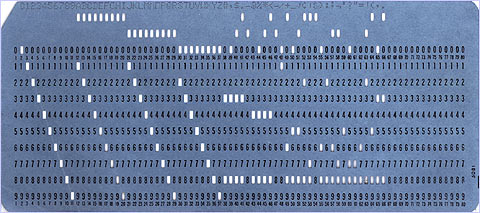 |
||
| A punch card | ||
And, of course, there was Charles Babbage, who noticed the error rate among these "computers" (the people that did long division for banks and governments, in this case in Britain) and invented a machine that could actually do long division! But he was ahead of his time, and it was such a complicated endeavor, the project got dropped. It wasn't until the 2000's that computer historians finally built Babbage's machine and showed that it would have worked if the world had just been a little more patient with him. Babbage is important because those early computer scholars looked up what Babbage did when they invented the modern computer... |
||
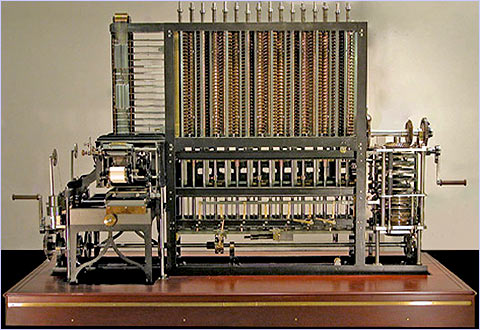 |
||
| Babbage's computer | ||
Anyway, the railroad "punch card" inspired a guy who had a contract with the U.S. government. The government wanted him to build a machine that could somehow make sense out of census data. The census, of course, is sort of a head count of all the people who live in America. And it asks about things like race, who owns a house, and how many men and women there are. By the late 1800's, it was taking almost 10 years to get all that data sorted out. And by the time it was done, it was useless, because everything had changed and it was time to take a new census. So, we got the "tabulator." It could add and subtract (and multiply in certain ways). And it used "punch cards" to read the data from the census. A punch card was just a piece of stiff paper with little holes punched in it. The census punch cards might say, "Do you own a house? [YES] [NO]" and there would be a hole punched for YES or NO. Except the questions weren't actually printed on the card. All of that is a super-boring part of the story. You need to know that the machine could tell which hole was punched, and it could add all of the home owners together for a "grand total" (like Excel), as well as sort the card into a little bin that contained only cards with homeowners (that little bin is a database - like Access). You get the idea... the tabulator! |
||
 |
||
| A tabulator | ||
The tabulator was a hit, and this guy went on to start IBM and sell tabulators to businesses, which businesses loved because now they could figure out how many Fords were coming off the assembly line that were either coupes or sedans or whatever. These massive companies were able to start getting their head around what the heck they were doing! Still no long division, though. And boy did they want it! Babbage, the inventor of the computer (which could, of course, do long division), had been forgotten. There were a few people working on machines that could do long division in the early 1900's, but it was obscure work. It took a war for humanity to finally get it together. World War II to be exact. By now, there were airplanes, and during wars, they dropped bombs. Hold on while I explain why that required long division... If bombs had been dropped from helicopters, they could have hovered over their target and the bomb would have dropped straight to the ground. But since they used airplanes, they couldn't hover. Airplanes can't hover. So, when the bombs got dropped out of the plane, they didn't fall straight down. They fell to the ground, for sure, but they also moved in the same direction the plane was flying, sort of like when you throw something out of a moving car. So guess what they needed to figure all this out? Long division, of course! Even the smartest people in the world - the "computers" - would occasionally screw up on long division, and a bomb would get dropped in the wrong place. But more importantly, it took forever to do all of that long division. Just like taking the census before the tabulator was invented, it was taking so long to do the math that by the time they figured out where to drop a bomb, the enemy had moved somewhere else. It didn't take a genius to figure out that the tabulator needed to be able to do long division (actually, it took a massive government bureaucracy to figure that one out)! So, now it all gets put together. The abacus. The slide rule. The tables. The punch cards from looms and railroads. Babbage's early attempt at a modern computer. The tabulator. Some binary contraptions from the early 1900's... It was like an awakening! And, among other creations, out popped the binary punch-card computer! It was a lot like the punch-card tabulator, except it could do long division. And there's an interesting story about electrical circuits and binary numbers and how the tabulator worked that's important if you're curious about how they did it. I've tried to put it together for you in the blue box below, but if you're not interested, you can skip the part in the blue box. The point is the first computers did tasks like Excel and Access, and IBM ended up selling this new "computer" to businesses after the war. It's worth noting that there were other computing devices that came out of the war that were less like the tabulator and were being worked on by universities and governments. But IBM probably had a lot of tabulator customers who were waiting on the computer, helping foster its success. The computer! |
||
|
||
It was 1948. This new "computer" had a punch-card-making machine (with a keyboard, or at least a "push-button interface") that isn't shown in the photo below, and it's really boring and hard to understand what was going on. In addition to punch cards, "applications" used "plug boards," also called "control panels," which had to be wired by hand. You could remove and insert different boards. Each one of these "applications" could read various punch cards. It's important to keep in mind that this computer evolved from the punch-card tabulator. It had "bugs," too. Bugs literally landed on the "vacuum tubes" of an earlier prototype (vacuum tubes were part of the "circuitry"). That's the way the story goes, or so I've heard. (It looks kind of "streamlined" or "art deco" or something, doesn't it? Still slick, though!) |
||
 |
||
| The IBM 604 - The first commercially available computer | ||
 |
||
| Restored photo of a preserved IBM 604 | ||
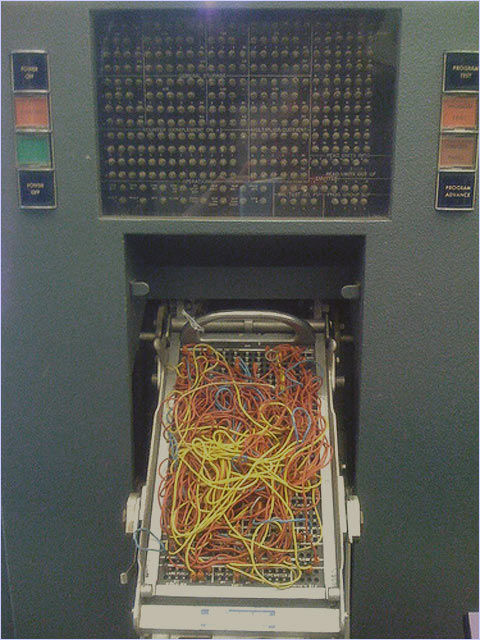 |
||
| The front of the IBM 604 showing the display panel (top) and the plug board (bottom) | ||
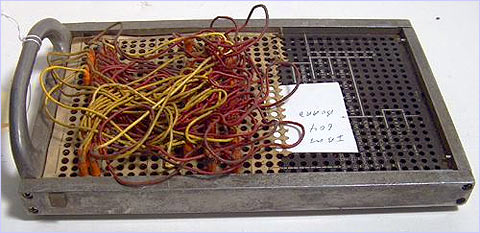 |
||
| An IBM 604 plug board (also called a "control panel") | ||
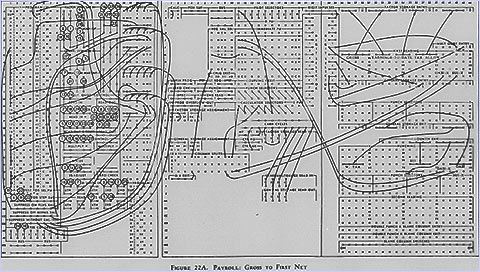 |
||
| A plug board / control panel wiring diagram from the IBM 604 manual | ||
 |
||
| The vacuum tubes of an IBM 604 | ||
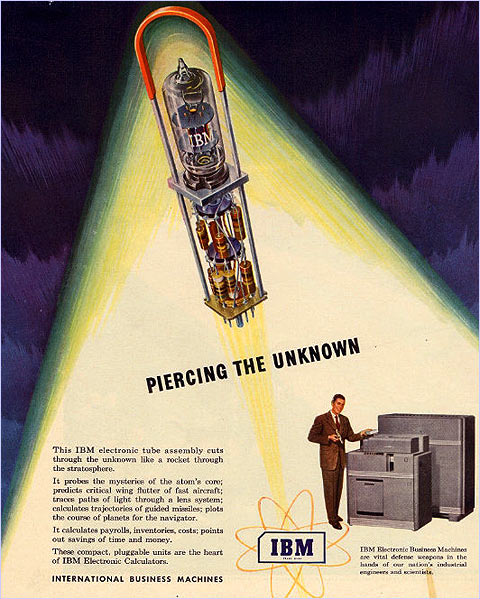 |
||
| An IBM 604 advertisement | ||
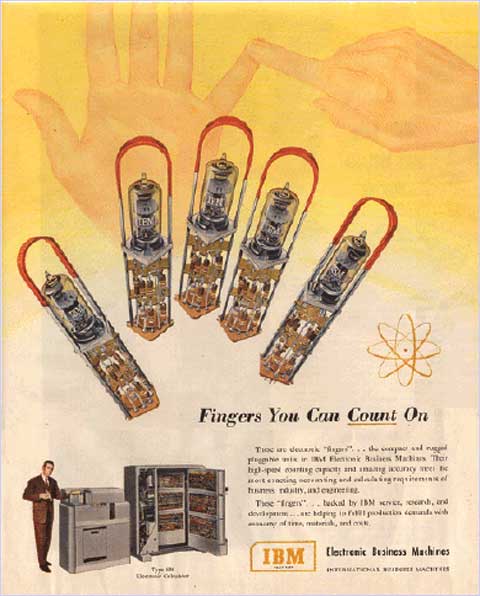 |
||
| An IBM 604 advertisement | ||
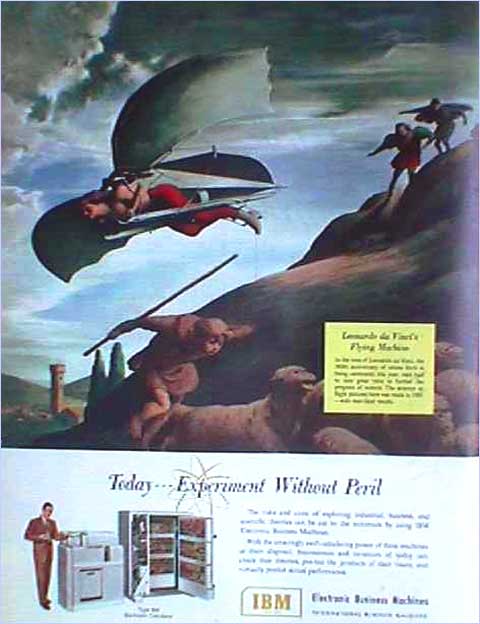 |
||
| An IBM 604 advertisement | ||
The 1950's added an early hard drive/RAM combo sort of thing called "drum memory." It appears to have worked a little like RAM in that it stored multiple punchcards for processing, but it ran like a hard drive in that it spun and was magnetic as opposed to electronic - like very slow RAM. The 50's also gave us the tape drive, which was a lot like a hard drive as we know it today. That tape drive and drum memory combination become important as computers develop. Keyboards and printers also appeared in the 50's, and there were early attempts at programming languages. The mouse and computer "sounds" were invented in the 1950's, but didn't really appear until later. Screens (monitors) appeared, but were probably specific to military applications such as radar, or used on experimental systems not for sale commercially. |
||
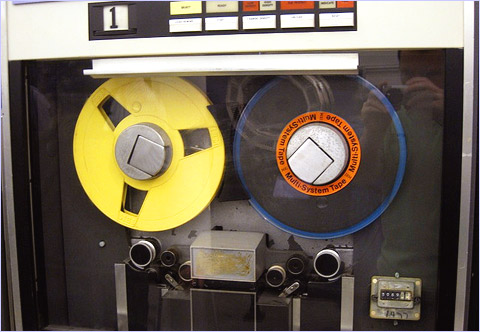 |
||
| An early tape drive | ||
The 1960's gave us the first computer "networks," and the "Internet" was invented in 1969. A lot of the stuff from the 50's started to make more of an appearance, too (after the bugs were worked out). In fact, the very first computer network appears to have become operational in 1958. One of the concepts behind the network was the use of devices that could access the "mainframe" from remote locations. The "mainframe" looked a lot like the IBM 604 pictured above, except they were getting bigger instead of smaller. |
||
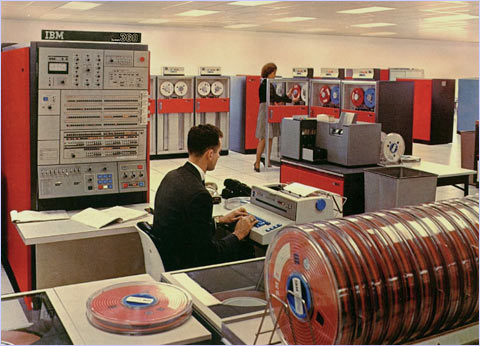 |
||
A 1960's mainframe |
||
Let's say you needed to work on some computer data, but you were nowhere near the "mainframe" - say you were in a "field office" - what could you do? A number of 1960's computer networks initially adapted teleprinters and teletype machines to put in remote locations and access the mainframe. Photos of those adapted mainframe teleprinter devices are rare, in black and white, and specific to one commercial computer network (American Airlines' SABRE network). However, the photo below is of a Telex teleprinter from the early 1960's, and looks very similar to a prototype photo of what would become the SABRE terminal, made by IBM. The network! |
||
 |
||
| A 1960's teleprinter | ||
 |
||
| SABRE teleprinter/terminal prototype | ||
 |
||
| Early SABRE teleprinter/terminal | ||
American Airlines' SABRE network was based on the military's SAGE network. Like SABRE, SAGE used adapted teleprinters and a mainframe, and was built by IBM. It became operational in 1958. SAGE was designed to connect radars, so it had a radar "screen." |
||
 |
||
| Early SAGE operator's console | ||
MIT's DEC PDP-1 - an experimental machine - was the fastest computer in the world in the late 1950's, and appears to feature something approaching a monitor. It also ran the world's first real-time computer video game, called SpaceWar, which preceded the better known game Pong. |
||
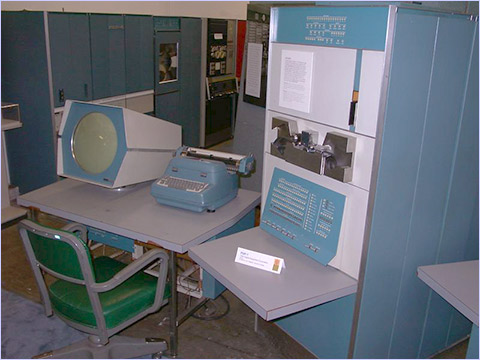
|
||
| DEC PDP-1 operator's console | ||
In 1964, IBM came up with the "dumb terminal," which looked like an early PC, but couldn't do anything on its own. It was designed to be hooked to the "mainframe," and "existing telegraph and telephone cables" were used. |
||
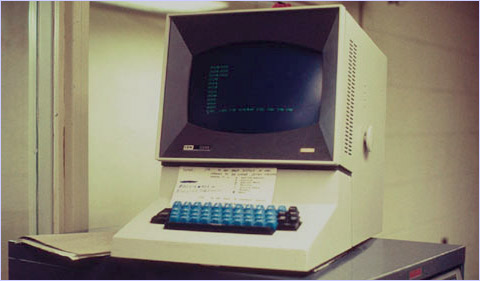 |
||
| A 1960's terminal | ||
That thing (the terminal pictured above) wasn't a computer! But you can see the inspiration... I mean, it looks like a friggin' computer! I think the one above is one of the types first developed by IBM in 1964. In any case, these things had to be hooked up to one of those giant "mainframes" to do anything. The Internet was based on the "network." Basically, the military saw all of this and thought (in their own dark sort of way), "What if someone bombed the mainframe?" So, their "network" was designed to survive a nuclear war. The Internet! The bugs with the vacuum tubes were worked out in the 1960's, too, thanks to the transistor (as used in manufactured models). The modern database started to take shape in the 1960's as well, which was helped along by the tape drive (which stored the data) and the "dumb terminal" (which let anyone, anywhere get at the database). The first corporate and government computer databases started in the 1960's... Back in the 60's, people didn't know how everything was going to turn out. Your company might buy that new computer with the tape drive, but they also made ones without tape drives. So, there were still punch cards everywhere. But I mean, the world as you know it today was now here, just on a much smaller and simpler scale. By the 1970's, punch cards were being gradually phased out, and "computer science" was getting big. Databases galore, modern programming languages, networks everywhere, microchips in devices... Oh, yeah, the microchip! Those old computers were HUGE and expensive! That was one of the reasons for the network and the "dumb terminal." But as the 1980's (which we love) dawned, somehow that dumb terminal got together with a processor and gave us "micro-computing" ("micro" meaning "small") That's what the PC (and the Apple) was called back then. The micro-computer! |
||
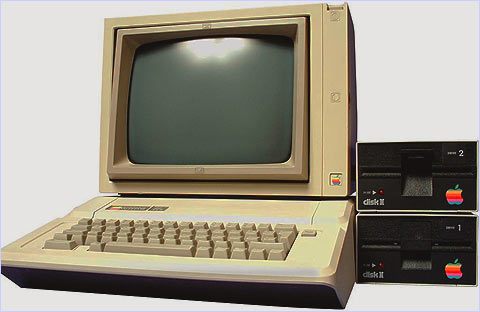 |
||
| An early micro-computer | ||
It looks familiar, doesn't it? This one you could just plug in and do stuff. No "mainframe" was required. So, here it finally is! I think those are punch card readers on the right... (They're not, they're "disk drives," which are similar to DVD devices.) Early micro-computers could be connected to existing computer networks in the workplace, and "dial-up networks" or "bulletin board networks" were popular among home users prior to the entry of the Internet into home computing. CompuServe, which began providing networking services to businesses using a dial-up time sharing system in 1969, entered the U.S. home dial-up market in 1978. By the early 1980's, CompuServe featured a dial-up encyclopedia for home use, news, and shopping. |
||
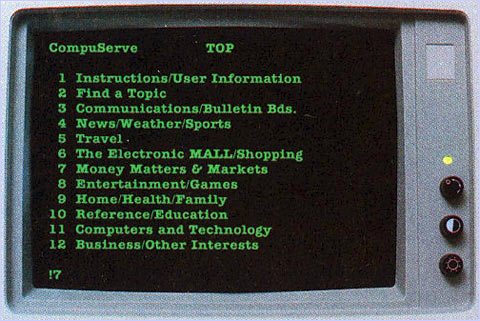 |
||
| A rendering of a CompuServe home screen, apparently in a print ad aimed at the home computing market | ||
 |
||
| An early CompuServe advertisement aimed at the home computing market | ||
Now it's time to meet our "corporate asshole" character. He's a manager at some huge company in 1980's America who believes that he's "self made" (probably voted for Reagan), and he doesn't understand bombing the rest of the world's factories in WWII (thanks to the computer) played a role in his success. In other words, his head's so far up his ass it isn't even funny! (It's funny!) Anyway, he's stuck with a database dating back to the 1960's (or 1970's, but you get the idea). It's the 1980's and "micro-computers" are the new thing. Lucky for him, there's this application (an app!) - let's call it "Terminal" - that makes it possible to pull up that old database on his new micro-computer. (The old database might still be on a tape drive in another city, but hopefully he upgraded during the 1970's...) Now, applications like Excel and Access can be used to do all sorts of new things with the old data (Excel and Access went by different names back then, but same idea). It was a pain, though, and he had to pay someone, and he wasn't even sure about this whole micro-computing thing. His company starts to think about things like using the billing database for direct marketing. Maybe... A decade goes by... (damn those things go by fast!) It's the 1990's! Yay! The 90's! By the 90's, micro-computers are in every cubicle (good thing he was indecisive, or he'd be out of a job), and the military has decided to allow the public to use its nuclear-bomb-proof Internet. So, the web browser comes out in the early 1990's, and someone at his company figures out how to pull up his old 1960's database on the web. "Apps" are developed. It's bliss. It's synergy. His 1960's database can be accessed in so many new ways, and this Internet thing, too... Please keep in mind that I'm not singling out any one person or company. This guy is just a character... Now quit looking at porn and sign those paychecks! |
||
 |
||
| The world's first web browser was key to making the web part of the Internet. | ||
 |
||
| Version 1.0 of the Mosaic web browser | ||
The corporate asshole's time on this post has come to an end... So, now the web has to work with all the stuff that's been rolled out. It's sometimes a bumpy road. But like the history of computers, it has a facinating story all its own. Maybe someday I'll do post on that (not anytime soon, though!). |
||
Related: - http://www.cnn.com/2011/TECH/innovation/06/15/ibm.anniversary... - http://www.computerhistory.org/revolution - http://www.columbia.edu/cu/computinghistory - http://en.wikipedia.org/wiki/Computer - http://en.wikipedia.org/wiki/IBM - http://en.wikipedia.org/wiki/Punched_card - http://www.computerhistory.org/revolution/punched-cards/2 - http://www.computerhistory.org/revolution/calculators/1 - http://www.computerhistory.org/revolution/analog-computers/3 - http://www.computerhistory.org/revolution/birth-of-the-computer/4 - http://en.wikipedia.org/wiki/Charles_Babbage - http://www.computerhistory.org/revolution/early-computer-companies/5 - http://www.computerhistory.org/revolution/real-time-computing/6 - http://www.columbia.edu/cu/computinghistory/tabulator.html - http://en.wikipedia.org/wiki/Tabulating_machine - http://www.columbia.edu/cu/computinghistory/hollerith.html - http://www.columbia.edu/cu/computinghistory/plugboard.html - http://www.columbia.edu/cu/computinghistory/604.html - http://en.wikipedia.org/wiki/IBM_604 - http://en.wikipedia.org/wiki/IBM_603 - http://en.wikipedia.org/wiki/Drum_memory - http://www.computerhistory.org/revolution/memory-storage/8 - http://mtl.math.uiuc.edu/non-credit/compconn/bits/binary.html - http://computer.howstuffworks.com/boolean6.htm - http://www.allaboutcircuits.com/vol_4/chpt_7/2.html - http://www.computerhistory.org/revolution/mainframe-computers/7 - http://www.computerhistory.org/revolution/input-output/14 - http://en.wikipedia.org/wiki/Computer_music - http://en.wikipedia.org/wiki/IBM_701 - http://en.wikipedia.org/wiki/IBM_System/360 - http://en.wikipedia.org/wiki/PDP-1 - http://plyojump.com/classes/mainframe_era.php - http://en.wikipedia.org/wiki/IBM_2260 - http://www.columbia.edu/cu/computinghistory/2260.html - http://en.wikipedia.org/wiki/IBM_3270 - http://www.columbia.edu/cu/computinghistory/2250.html - http://en.wikipedia.org/wiki/Semi-Automatic_Ground_Environment - http://en.wikipedia.org/wiki/Sabre_%28computer_system%29#History - http://www.wired.com/wiredenterprise/2012/07/sabre/?pid=133#slideid... - http://en.wikipedia.org/wiki/Teleprinter - http://en.wikipedia.org/wiki/Integrated_circuit - http://en.wikipedia.org/wiki/Internet - http://quickbase.intuit.com/articles/timeline-of-database-history - http://en.wikipedia.org/wiki/Database - http://en.wikipedia.org/wiki/Computer_network - http://en.wikipedia.org/wiki/CompuServe - http://en.wikipedia.org/wiki/Microcomputer Artwork (may include photos, images, audio, and/or video): - http://www.vhinkle.com/china/inventions.html - http://web.mit.edu/museum/exhibitions/sliderules.html - http://en.wikipedia.org/wiki/Punched_card - http://www.computerhistory.org/babbage - http://www.flickr.com/photos/iannelson/143443768 - http://www.computerhistory.org/collections/accession/102645462 - http://www.piercefuller.com/library/p8041009a.html?id=p8041009a - http://farm3.staticflickr.com/2405/2480925747_41b6b6fd11.jpg - http://www.computerhistory.org/collections/accession/102656684 - http://www.ii.uib.no/~wagner/OtherTopicsdir/EarlyDays.htm - http://www.science.uva.nl/museum/604.php - http://www.computerhistory.org/revolution/early-computer-companies/5... - http://www.columbia.edu/cu/computinghistory/ibm-pu-ad.gif - http://ed-thelen.org/comp-hist/vs-ibm-604-ad.jpg - http://www.flickr.com/photos/44147515@N08/4054327775 - http://plyojump.com/classes/mainframe_era.php - http://www.baudot.net/teletype/M32.htm - http://www.wired.com/wiredenterprise/wp-content/uploads//2012/07... - http://plyojump.com/classes/images/computer_history/sabre_reservation... - http://en.wikipedia.org/wiki/File:SAGE_console.jpeg - http://www.aes.org/aeshc/docs/recording.technology.history/images5... - http://en.wikipedia.org/wiki/IBM_2260 - http://www.n24.de/media/_fotos/bildergalerien/002011... - http://www.computerhistory.org/revolution/the-web/20/400/2337 - http://cdn.inquisitr.com/wp-content/compuserve.jpg - http://webdesign.tutsplus.com/articles/industry-trends/a-brief-history... Special Thanks: - A lot of this was worked out years ago with two high school teachers, and later, two college professors, three students, and a number of bosses and coworkers. I know they'll at least like the binary and light switches part... |
||
|
||
As the U.S. Supreme Court questions the constitutionality of America's new healthcare law, I'm going on a bit of a legal rant tonight. But if you don't feel like reading all of it, let me just say that I think Trayvon Martin was murdered in the U.S. state of Florida by a racist redneck with a gun who felt justified in taking the law into his own hands. Trayvon Martin's killer, George Zimmerman, shot Trayvon Martin on February 26, 2012 in Sanford, Florida. Trayvon was a 17-year-old black male who left his father's girlfriend's house to walk to a convenience store and buy some candy. As he walked back to the house, a vehicle began following him. The vehicle was driven by George Zimmerman, a deluded resident of the neighborhood who believed he had "special powers," and could threaten and shoot his neighbors if the mood struck him. Zimmerman called the police, and the police advised Zimmerman not to follow Trayvon. The events that followed are unclear, but Zimmerman's comments to police indicated that he felt he was in a position to threaten anyone who dared to walk down "his street." Zimmerman was crazy. Zimmerman shot Trayvon and killed him, then claimed he felt threatened. The state of Florida has a law that allows crazy people to shoot at anyone they feel threatens them. Similar laws, which exist in one form or another in 31 states, are nicknamed "stand your ground" laws. The laws are a joke. The state of Virginia has a law (last time I checked) nicknamed "life over property." It's the complete opposite of "stand your ground." In other words, if someone breaks into your house and steals your TV, you can't shoot them unless they threaten you in certain ways. Their life is worth more to the state than your property, so "life over property." You'd be guilty of murder (or manslaughter or whatever) if you shot and killed the burglar. But the law is a joke because anyone could say, "I thought the burglar had a gun." I've talked to at least 6 people who've added, "you can shoot them in the yard, too, if you drag them in the house. No one will ask too many questions..." Virginia is said to now be considering "stand your ground" laws. In certain states, burglary is listed by some "stand your ground" laws as a reason to shoot someone, even if the burglar is unarmed. Trayvon was not a burglar. He was walking down the street in a neighborhood he was familiar with. He was a good kid. But George Zimmerman evoked Florida's "stand your ground" law to justify murdering Trayvon, and the police "didn't ask too many questions." It looks like Zimmerman, and at least a few members of the Sanford, Florida police department, were racists, too, and disliked young black men. "Stand your ground" laws are a joke. They basically legalize the murder of innocent people. In fact, law in the U.S. is becoming more and more of a joke every day. Did a Supreme Court "judge" mention forcing people to eat broccoli yesterday (March 27th) in arguments over the health insurance mandate? U.S. universities try to get law students to take at least one philosophy class on their way to becoming a lawyer or judge, but clearly that broke down yesterday. Apparently, whether or not the universe is a paradox of time will have an impact on healthcare in the U.S. Because, according to the Supreme Court, "being born... blah blah blah ...entry into the healthcare market... blah blah blah ...government regulate... blah blah blah." So, if being born blah blah, what's a person? Are they conscious? Is broccoli alive? Alive how? I couldn't believe what I read about what happened in court yesterday. And that's all that's really standing in George Zimmerman's way in terms of allowing him to murder whoever he wants. I don't want lawlessness. I don't want to have to sit out in the yard and shoot warning shots at anyone who drives down "my street." I don't like traffic, though. Maybe I could just hold a gun in the air and play sound effects (because you can't discharge a firearm in the city.) I don't think firecrackers could be the sound effects, though. I know fireworks are illegal, but I don't know about firecrackers. I've got some big speakers, but I think you're only aloud certain decibels during certain times of day. Probably it would just be easier to shoot people! Nah... We'll get through this somehow... |
||
 |
||
| In memory of Trayvon Martin | ||
Artwork (may include photos, images, audio, and/or video): - http://www.collegedj.net/2012/03/25/hip-hop/plies-we-are... |
||
|
||
Albert Einstein's complete archives - from personal correspondence with half a dozen lovers to notebooks scribbled with his groundbreaking research - are going online for the first time. The Hebrew University of Jerusalem, which owns the German Jewish physicist's papers, is pulling never-before seen items from its climate-controlled safe, photographing them in high resolution and posting them online - offering the public a nuanced and fuller portrait of the man behind the scientific genius. Only 900 manuscript images, and an incomplete catalog listing just half of the archive's contents, had been available online since 2003. Now, with a grant from the Polonsky Foundation UK, which previously helped digitize Isaac Newton's papers, all 80,000 items from the Einstein collection have been cataloged and enhanced with cross-referencing technology. The updated web portal, unveiled on March 19, 2012, features the full inventory of the Einstein archives, publicizing for the first time the entirety of what's inside the collection, and giving scholars a chance to request access to items they previously never knew existed. "Knowledge is not about hiding. It's about openness," said Menachem Ben Sasson, president of the Hebrew University. Check out the archive HERE! |
||
 |
||
Related: - http://www.guardian.co.uk/science/2012/mar/19/albert-einstein... - http://lightyears.blogs.cnn.com/2012/03/19/einsteins-writings... Artwork (may include photos, images, audio, and/or video): - http://lightyears.blogs.cnn.com/2012/03/19/einsteins-writings... |
||
|
||
The Affordable Care Act is under attack. Join Health Care for America Now and their partners on March 26th, 27th, and 28th from 8:00 AM to noon each day to defend the law. The protests will be taking place in front of the Supreme Court in Washington, DC. Monday, March 26 – Supreme Court Vigil: We will be joined by doctors, nurses, and other health care providers, along with people of faith who will hold a "prayerful witness" in support of the health care law. Tuesday, March 27 – Don’t Deny My Care, Protect the Health Care Law: Right-wing extremists want to take us back to the days of caps on lifetime benefits, denial of care for pre-existing conditions, out-of-pocket charges for preventive care like contraception and more. Wednesday, March 28 – Stop the Attacks on Medicare and Medicaid: The Supreme Court will be discussing the health care law's expansion of Medicaid to care for millions of people. Meanwhile, the Republicans across the street in Congress will be promoting Rep. Paul Ryan's destructive budget proposal and fighting to end Medicare as we know it... The links above for March 26th, 27th, and 28th link to Facebook Events, so be sure to let them know you'll be there! |
||
 |
||
| President Obama signs Affordable Care Act | ||
Related: - http://healthcareforamericanow.org/2012/03/16/call-to-defend-health... Artwork (may include photos, images, audio, and/or video): - http://healthcareforamericanow.org |
||
|
||
Check out President Obama's new Healthcare App! It looks like Medicaid will soon cover nearly all low-income individuals and families. Starting in 2014, all Americans earning below a certain income will be eligible for Medicaid. That's a huge improvement for our country, and for how we feel about our country! Take a moment with me to think about what it means... Now CLICK HERE to try out the app! |
||
 |
||
| Click HERE to try out the app! | ||
Related: - http://www.barackobama.com |
|
||||||
[UPDATED: March 21, 2012] Click HERE for IMPORTANT INFORMATION about the protest! Today, March 21st, George Osborne, the man in charge of Britain's sinking economy, will present his government's third austerity budget. In it, he will set out a continuation of the cuts that have decimated Britain's public services and put up to 6.3 million people out of work (1 2 3). George will tell us that "there is no alternative" to his slash-and-burn economics; that austerity is the only route to recovery. But even George can't have failed to notice one thing - austerity isn't working. On March 21st, be outside Downing St. in London at 11am. Join UK Uncut's historically inspired protest and form an "unemployment line" that will wipe the smirk off of George's face, and demand an economy that bails out people instead of banks. Austerity isn't just unfair and unnecessary - it isn't working. Britain's better off with the alternatives. See you at Downing St. in London! Click HERE for IMPORTANT INFORMATION about the protest! |
||||||
 |
||||||
| Click HERE for the Facebook Event! | ||||||
 |
||||||
| Click the play button above to start the video. | ||||||
Related: - http://www.facebook.com/events/321251107937780 - http://ukuncut.org.uk/blog/press-releasedole-queue-outside-downing... - http://ukuncut.org.uk/blog/austerity-isnt-working - http://ukuncut.org.uk - http://falseeconomy.org.uk See Also: - How "Austerity" Could Usher in a Global Recession (Hot Topics, 2011) - Merkel Changing Her Mind About Austerity - Obama Rejects Cameron's Austerity Plans - Stop Tax Cuts for Super-rich, Stop Cuts to Services - U.K. Cons Plan Backdoor Healthcare Privatization - A Better Future Artwork (may include photos, images, audio, and/or video): - http://ukuncut.org.uk/blog/austerity-isnt-working |
||||||
|
||||||
The Speak Up For Libraries coalition is an alliance of organizations and campaigners working to protect libraries and library staff, now and in the future. Public libraries and staff have a long and proud tradition of providing open access to information and promoting literacy. During times of recession, they are more vital than ever. Public library services and staff are currently under threat from cuts on a massive scale. Of the 4,612 public libraries in the U.K., an estimated 10% have either been closed or are under threat. The number of paid staff in libraries has fallen by 4% over the past year, while the number of volunteers has increased by 22%. Local campaigns are taking place all over the U.K. to counter threats to library services. Local library users, campaigners, and library staff need to come together to Speak Up for Libraries and send a clear message to Members of Parliament (MP's) in Britain, and their contemporaries around the world! MP's in Britain, in particular, must take action now to ensure library services are sustained and developed into the 21st century. Click HERE to get involved! |
||||||
 |
||||||
Related: - http://www.speakupforlibraries.org - http://falseeconomy.org.uk/blog/speak-up-for-libraries-lobby... - http://falseeconomy.org.uk/blog/uk-libraries-under-threat See Also: - Stop Tax Cuts for Super-Rich, Stop Cuts to Services Artwork (may include photos, images, audio, and/or video): - http://www.speakupforlibraries.org/resources.asp |
||||||
|
||||||
A so-called "viral video" on YouTube and Vimeo is raising awareness throughout the world of social networking about a warlord named Joseph Kony, whose "Lord's Resistance Army" practices guerilla warfare primarily in the African nation of Uganda, but has also reached into the African nations of South Sudan and Democratic Republic of Congo. According to the charity Invisible Children, which is dedicated to bringing Kony down by the end of 2012 (cleverly naming their movement "KONY 2012"), Joseph Kony recruits children into the "Lord's Resistance Army" to kill innocent people in Uganda and the surrounding region of Africa. The stated goals of the "Lord's Resistance Army" are political and religious, but its real goals appear to be to increase the power of the brutal warlord Joseph Kony. Unfortunately, the KONY 2012 movement against Joseph Kony has been dragged into numerous political battles. The movement, which features a poster with an elephant and a donkey, is intended to be bipartisan, and appeal to young people during a U.S. election year. But more seasoned political types have spun the movement in a number of ways, ranging from "setting a much-needed precedent for military intervention" to "exaggerating the brutality of Joseph Kony." There are other criticisms of the movement as well. While it is unfortunate that the movement has been dragged into so many political battles, it is also unfortunate that various political considerations have been left out. The bottom line is that Joseph Kony is a brutal warlord, and bringing him down has broad political and social support, including the support of top Democrats and Republicans. A number of influential celebrities are also supporting the KONY 2012 movement. I support the KONY 2012 movement and the current effort to bring down Joseph Kony. I encourage you to watch the video below, pledge your support, and, if possible, make a donation. Your donation will help spread awareness, foster political support, and provide aid to people threatened by Joseph Kony and his "Lord's Resistance Army." CLICK HERE to visit the KONY 2012 website! |
||||||
 |
||||||
| Click the play button above to start the video. | ||||||
Related: - http://www.kony2012.com |
||||||
|
||||||
|
||||||
 |
||||||
Related: - Kane, Gordon. (2000). Supersymmetry. Cambridge, Massachusetts: Perseus Publishing. - Heilbron, J.L. ed. (2003). The Oxford Companion to modern science. New York: Oxford University Press. - http://en.wikipedia.org/wiki/Quantum_field_theory Artwork (may include photos, images, audio, and/or video): - http://lookingglassgazette.com/2011/04/23/worlds-largest-atom-smasher... |
||||||
|
||||||
[UPDATED: Mar. 5, 2012] On Friday, Mar. 2, 2012, multiple U.S. states were hit by a string of tornadoes that swept through the South and Midwest sections of the United States. The Heartland states affected include Illinois, Kentucky, Indiana and Ohio, but as many as 7 other states were hit by the storms. Dozens of people were killed, and schools, churches, businesses, and homes were turned to rubble. Thousands of people were left homeless. The residents of those states need food, shelter, healthcare, medicine, and electricity, as well as other relief and cleanup supplies. Emotional support is also an important part of the relief effort, and mental health workers need to be provided. The Heartland needs your help! Please help now by donating to the Red Cross. Here are some ways to donate: - Use this link: https://american.redcross.org/site/Donation... - You can also text REDCROSS to 90999 on your mobile phone to donate $10 to relief efforts. - Or, call 1-800-REDCROSS (1-800-733-2767) to give money or schedule a blood donation. A number of other charities have been brought to my attention either by email or through promotion. Feeding America is taking donations online and by phone: - Use this link: https://secure.feedingamerica.org/site/SPageServer?pagename=giveonline - Or, call 1-800-771-2303 to donate to Feeding America. ABC News has put together a list of other ways to donate to help the U.S. Heartland: - http://abcnews.go.com/US/tornados-rip-south-midwest/story?id=15841843... Many of these sites continue to take donations for other disasters throughout the world. As you make your donation to help the U.S. Heartland, consider helping provide much-needed relief to victims of other disasters. Related: - http://www.redcross.org/portal/site/en/menuitem.1a019a978f421296e81e... - http://www.washingtonpost.com/blogs/capital-weather-gang/post/tornado... - http://abcnews.go.com/US/tornados-rip-south-midwest/story?id=15841843... - http://seattletimes.nwsource.com/html/nationworld/2017674391_stormtow... See Also: - Help Missouri & Arizona - Help U.S. Spring Flood Victims - Help Tornado & Wildfire Victims in Southern U.S. - Help Japan |
||||||
|
||||||
[UPDATED: Feb. 28, 2012] I'm really excited to do a post like this, but I'm also very nervous. I listen to and enjoy just about every genre of music, even though a lot of people think I'm "Mr. Rock and Alternative." And I do listen to Alternative, Rock, and Alternative Rock a lot. But I love music, so I listen to a lot of other genres, too. With regard to Alternative, though, I've noticed a growing trend: Electronic Alternative (as opposed to Alternative Electronic). When it comes to music, it's really hard to pinpoint something like this. Maybe I shouldn't even try... Nah, I'd be a fool not to try. What I'm trying to say is I picked a song, and I hope you like it. The song I picked is by the band Awolnation, and is entitled Not Your Fault. It has similarities to other songs I'm hearing, especially from some independent artists on YouTube who may be in the same genre, and could perhaps be considered in the same genre. You'll have to tell me what you think... Of course, I'm not suggesting that all artists on YouTube can be considered as part of the Electronic Alternative genre, or even that Electronic Alternative is a fitting description for a large number of artists on YouTube. But a lot of artists on YouTube - in every genre - are part of a movement in music publication involving independent artists who are not signed to a record label. This is a movement I support, and I wish I could have nailed this on every detail. Awolnation is signed to Red Bull Records. But the band claims this label lets them do whatever they want, and describes the relationship with their label as "more of a 'partnership.'" I picked the song because the sound seemed like what I could consider "Electronic Alternative," and I learned more about the band on Wikipedia. I like them. But hey, I may not have even nailed the sound... So, here's the song I picked in my effort to describe Electronic Alternative... |
||||||
|
||||||
Artwork (may include photos, images, audio, and/or video): - http://www.youtube.com/watch?v=jm9-yVdxbSs |
||||||
|
||||||
So, you guys know that the whole imaginary time thing borrows from extra-dimensional math, right? I mean, you can't go sideways like that without an extra dimension. Probably I should have made that clearer. Yeah, I'm sure that's the clearest part of that paper... You can send Stephen Hawking a thank-you note for being cool about it, along with the rest of the physics community. Not that I'm saying what I did isn't a bit different. It is. (Does anyone remember the drama there? Can you believe I didn't say anything? There's a lesson to be learned, huh?) The Descartes stuff was controversial, too. Back when I wrote that section, no one had written about Descartes that way, but my professors liked it enough to edit it for me. (The whole paper was edited, and I was instructed to save the edited versions in case anyone ever questioned whether or not I wrote it...) Anyway, five years later, philosophers began to write about Descartes the same way. And now a lot of people understand Descartes that way. (It's really good, too, if I do say so myself...) "The 'particle-slit' section could be clearer." Well, I needed to advance the narrative. "So, you wrote it as a narrative, with quote boxes acting as sort of 'bookish punctuation.'" Well, I wouldn't say "bookish punctuation," but I can understand how you can see it that way. I wouldn't say I wrote it as a narrative, either. But in explaining something like, say, "logical positivism," it had a narrative quality (of course, there were no factual errors). I thought they were teaching me how to write, but they were taking my writing style and fixing it for me... One Internet fan brought up a point about the "mind's eye." The OCM quote isn't the best. The mind's eye section beneath the quote was actually added by a professor to make it clearer. To make it clearer still, don't consider it in terms of memory, consider it in terms of sight. In other words, just to "see" the world around you in real time, you need a mind's eye. Another Internet fan brought up a point about consciousness. It's a "hidden variable" theory. It's not like Penrose and the microtubules. (Did you read about Penrose and Hawking?) Yet another Internet fan brought up a point about the use of quotation marks. It's a pretty standard use of quotation marks. "That's a bad sentence, but the quotation marks save you..." It's not a secret or anything. I'm fine with that... Obviously, there's a lot more to the story. A LOT MORE! But tonight I thought I'd shove this in "The Blog." The Blog... The Blog is held to pretty high standards now. I always look forward to editing it... when I'm not doing something else. But I mean, hey, I wouldn't put anything in The Blog I wasn't confident about... I'm in my 15th year of doing this. I've been hit really hard. Feel free to take a swipe, ask questions, etc... Maybe I'll answer you, eventually... |
||||||
|
||||||
I don't like cars, though. (Probably doesn't own a car...) Why not? Just don't... Well, I think America should invest more in public transportation, too. Trains are a great way to get around, but we just don't have enough of them. Don't like trains either. Why not? I don't like any of that shit. I don't like things with motors or computers or any of that shit. (Dude's playing Xbox...) Well, how should people get around, then? Boats! Boats have motors, though. Use sail boats. That could work, except that there aren't rivers in every town in America. Don't go to those towns then. What about all the people that already live there? They can move. How are they gonna move if there's no river? They'll figure it out. That's harsh, man. I don't like computers, either. They were invented for war. (Whole room gets scared...) (Fuck. Who was that guy? Garbage? ... Babbage!) No they weren't. Charles Babbage invented the first computer back in the time of boats. It was steam powered. No motors. (Not like a gas or electric motor, if that's what he means... plus a few other details that don't belong here...) That's alright then... What about steam-powered trains? They're alright I guess. Cool! Hey man, got any weed? Nah. That's alright. I brought a little. I have to go soon, though. Hey, would you all like to smoke one right quick? (All together...) YES!!! |
||||||
 |
||||||
Artwork (may include photos, images, audio, and/or video): - http://en.clipart-fr.com/Clipart/Boats/ - http://www.congenjamaica-ny.org/contactus/ |
||||||
|
||||||
It's clouding up outside. Maybe I should have titled this post "The 'Dry' of the Tiger..." I sing that one a lot when I ride my bicycle in the rain. I have several portable MP3 players, but I like singing and humming to myself instead. Just that way I guess. Songs, beats... it's all rattling around up there. |
||||||
|
||||||
Artwork (may include photos, images, audio, and/or video): - http://www.youtube.com/watch?v=btPJPFnesV4 |
||||||
|
||||||
Vote for President Obama in 2012! |
||||||
 |
||||||
- Signed into law an economic plan that saved America from a depression, restored growth, and created or saved as many as 3.6 million jobs. - Signed into law landmark health insurance reform that holds insurance companies accountable, gives people and small businessess greater control of health care, and improves the quality of health care for all Americans. - Fought against Wall Street lobbyists to sign into law historic consumer protections and financial reforms that shield American families from unfair lending practices from credit card and mortgage companies, rein in the excesses of Wall Street, and work to prevent future financial crises. - Reformed the college loan system by ending subsidies to banks and using the money to make college more affordable. He also invested in community colleges that are providing Americans with the skills they need to succeed in today's economy. - Rescued the American auto industry, which saved millions of American jobs and helped GM and Chrysler become profitable again while repaying taxpayers. - Repealed "Don't Ask, Don't Tell," which makes it possible for individuals to serve in the military regardless of their sexual orientation. - Helped women get the equal pay they deserve by signing into law the Lilly Ledbetter Act. - Ended the war in Iraq, initiated a responsible drawdown of forces in Afghanistan, and ordered the operation that killed Osama bin Laden. Related: - http://www.barackobama.com/about/barack-obama Artwork (may include photos, images, audio, and/or video): - http://www.barackobama.com/about/barack-obama |
||||||
|
||||||
"Lift off!" reported the European Space Agency (ESA) via its Twitter feed shortly after the launch. "On 13 February 2012, the first Vega lifted off on its maiden flight from Europe's Spaceport in French Guiana." Vega is a rocket created to carry smaller payloads containing satellites for scientific and earth observation missions. The Vega program was launched by the ESA in 1998 to complement the ESA's heavy Ariane 5 and medium Soyuz rockets. It is unique in that it can accommodate a variety of different payload configurations and can carry mulitple smaller satellites in addition to a main one. Monday's mission contained a total of nine small satellites. Since this is Vega's first mission, tests will be conducted to qualify the overall system. The Vega project is named after the second brightest star in the northern hemisphere, a star which has been termed "arguably the next most important star in the sky after the Sun." |
||||||
 |
||||||
Related: - http://www.dw.de/dw/article/0,,15738982,00.html Artwork (may include photos, images, audio, and/or video): - http://www.sen.com/news/vega-rocket-inaugural-flight.html |
||||||
|
||||||
Today is Valentine's Day. Whether you are sharing it with that special someone, or just surfing the Internet, join me in wishing US Uncut a Happy Birthday and congratulating them on their 1 year anniversary! US Uncut was started exactly 1 year ago today! So, today is not just Valentine's Day, and it's not just their birthday and anniversary... it's US Uncut Day! |
||||||
 |
||||||
After I did this graphic, I checked their website and it appears to officially be the 13th! But I've already done the graphic, and I don't think they got everything up and running until the 14th! Artwork (may include photos, images, audio, and/or video): - http://www.usuncut.org/images/logos/USuncut-logo-500.png - http://lovesmss.com/valentine-day-sms - http://www.webweaver.nu/clipart/birthday2.shtml - http://www.engravedglasses.net/expensive-champagne-flutes/article/2007... |
||||||
|
||||||
NewsCorp is a global corporation run by Rupert Murdoch, "owner" of Fox News. Last summer, NewsCorp's News International, a corporation in Britain that runs several newspapers, got into big trouble over what has been dubbed the "phone hacking scandal." News of the World, a British tabloid newspaper owned by News International, had been under investigation for several years for hacking the phones of celebrities, as well as the Royal Family. News about the investigation had been seen in the media sporadically for awhile, but the story exploded after News of the World was caught hacking the phone of a little girl in Britain who had been murdered. The tabloid was deleting her old voicemails to make room for new voicemails, then listening to the messages left by people who called. The entire world was outraged. Celebrities, people in government, and people who had been written up in the tabloid began to come forward in greater numbers as a larger government investigation launched. It was revealed that News of the World had even hacked the phones of families of members of the British military who had lost their lives in war. The paper was run by Rupert Murdoch's son, James Murdoch. The statements and testimony of the people who came forward are really what makes this a powerful story. It was heartbreaking, and revealed an "evil corporation" that cared little about wrecking people's lives. As the investigation in Britain pressed on, the U.S. Department of Justice and FBI announced their own investigations of NewsCorp. Among the allegations, the company may have hacked the phones of 9/11 victims and their families. The investigations in Britain and the U.S. are still going on, and people continue to come forward. Britain's political leaders have also gotten involved. Many of them revealed the News of the World tabloid had conspired to bring down the British government, and became so involved in British politics and elections that the paper was a threat to British democracy. One of the "whistleblowers" was found dead in his home. And evidence of police bribery also surfaced. Rupert Murdoch has now closed the News of the World, as well as the London headquarters of NewsCorp's News International. He also gave up his bid to buy Sky News, a British 24-hour news channel, although he still "owns" part of it. But Murdoch is back in London over a similar scandal involving another British tabloid run by News International called the Sun. So far, five arrests have been made for police bribery. As this story progresses in Britain and in the U.S., I hope to share more of the statements and testimony of the people who have been affected by this truly "evil corporation." This post is only a start. |
||||||
 |
||||||
| Rupert Murdoch testifies before a British House of Commons committee | ||||||
Recent: - http://www.guardian.co.uk/media/2012/feb/11/sun-journalists-arrested Wikipedia Article: - http://en.wikipedia.org/wiki/News_International_phone_hacking_scandal The Guardian's Resource Pages: - http://www.guardian.co.uk/media/phone-hacking - http://www.guardian.co.uk/media/newsoftheworld Chronological Bookmarks with "Phone Hacking" or "Phone-Hacking" in the Title or URL: - http://www.guardian.co.uk/media/2011/jul/06/phone-hacking-david-cameron... - http://www.cnn.com/2011/WORLD/europe/07/06/uk.phonehacking/index.html... - http://www.guardian.co.uk/media/blog/2011/jul/09/phone-hacking... - http://www.guardian.co.uk/media/2011/jul/22/phone-hacking-authorities... - http://www.bbc.co.uk/news/uk-14045952 - http://www.guardian.co.uk/media/2011/jul/28/phone-hacking-sarah-payne - http://www.guardian.co.uk/culture/2011/jul/30/jude-law-phone-hacking... - http://news.bbc.co.uk/democracylive/hi/guides/newsid_9459000/9459040.stm - http://www.guardian.co.uk/media/2011/aug/16/phone-hacking-now-reporter... - http://www.newstatesman.com/blogs/the-staggers/2011/08/phone-hacking... - http://www.huffingtonpost.com/2011/08/16/phone-hacking-cover-up-news-of... - http://www.guardian.co.uk/media/2011/aug/18/phone-hacking-news-of-the-world - http://www.bbc.co.uk/news/uk-14045952 - http://www.guardian.co.uk/media/2011/aug/19/phone-hacking-detective-arrested - http://www.bbc.co.uk/news/world-14596815 - http://www.guardian.co.uk/media/2011/sep/02/phone-hacking-arrest - http://www.guardian.co.uk/media/2011/sep/23/neil-wallis-revelation-questions... - http://www.guardian.co.uk/media/2011/sep/30/phone-hacking-neville-thurlbeck - http://www.guardian.co.uk/media/2011/oct/05/phone-hacking-news-international... - http://www.guardian.co.uk/media/blog/2011/nov/10/phone-hacking-james... Achronological Bookmarks without "Phone Hacking" or "Phone-Hacking" in the Title or URL ("News of the World," "Rupert Murdoch," "James Murdoch," and "NoW," in that order): - http://www.huffingtonpost.com/2011/07/06/rupert-murdoch-news-of-the-world... - http://www.bbc.co.uk/news/uk-england-london-14339271 - http://www.guardian.co.uk/media/2011/sep/25/carl-bernstein-rupert-murdoch... - http://www.bbc.co.uk/news/business-14770818 - http://www.guardian.co.uk/media/2011/oct/24/james-murdoch-news-corp-share... - http://www.bbc.co.uk/news/uk-14541848 Artwork (may include photos, images, audio, and/or video): - http://www.syracuse.com/news/index.ssf/2011/07/the_phone_hacking_scandal... |
||||||
|
||||||
On February 6, 2012, Solvay, a Belgian chemical company, hailed the successful entry into service of what it said was the largest fuel cell of its type in the world. It is a super-battery that produces enough electricity to power nearly 1,400 homes, and the battery's Proton Exchange Membrane (PEM) fuel cell has been producing clean electricity at a "steady rate" for weeks at a SolVin chemical plant in Antwerp, Belgium. Antwerp is located in Europe's new "Project Hydrogen Region," also known as Europe's Flanders/South Netherlands region. The SolVin plant in that region is a joint venture between Solvay and Germany's BASF. Other companies contributing to the production of the fuel cell super-battery include Belgium's Umicore, and Netherlands' Nedstack and MTSA, along with other European companies. Project Hydrogen - Flanders/South Netherlands aims to develop both knowledge and hydrogen applications in the region, with a clear focus on sustainable hydrogen and early market applications, such as maritime, logistical, and inter-urban applications, while maximizing the use of European technology. Project Hydrogen - Flanders/South Netherlands is financed by the E.U., the Flemish government, the Dutch government, and the industry. The new fuel cell super-battery used in the project converts chemical energy from hydrogen into clean electricity through an electrochemical reaction with oxygen, releasing only water as a byproduct. So far, the super-battery "has generated over 500 MWh in about 800 hours of operation," Solvay said in a news release. The company said this equates to the electricity consumption of 1,370 families over the same period. Unlike older alkaline fuel cells, this successful PEM super-battery contains Solvay's innovative specialty polymers and SolviCore's membrane electrode assemblies (SolviCore is joint venture between Solvay and Umicore). The industrial scale-up project takes PEM fuel cell technology to a whole new level. The fuel cell also increases the energy efficiency of the SolVin plant's brine electrolysis system, which is used to produce chemicals like chlorine. The plant primarily produces vinyls and plastics, and chlorine is involved in the process. Hydrogen for the super-battery's fuel cell is also involved. Currently, most plastics like those manufactured at the SolVin plant in Flanders/South Netherlands are produced from petroleum, but it appears similar plastics can be produced from agricultural materials like corn, potatoes, sugar cane, and squash - a process which is on the rise. These agricultural materials can also be used to produce hydrogen, which is present in plastics produced from them. (In some cases, chlorine appears to be present, too, but not enough information is available.) Unfortunately, the plastics industry seeks to genetically modify these agricultural materials for the production of plastics and other products. But there is too great a risk of contamination of other similar crops (such as corn, etc.), even though the modified agricultural materials would not be consumed by humans or animals. BASF recently faced opposition in Europe for its efforts to genetically modify potatoes for industrial purposes. There do not appear to be any serious problems with using sustainable agriculture that has not been genetically modified (non-GMO) for industrial products. Sustainable, non-GMO, agriculture-based plastics are a great idea. In fact, they can even safely bio-degrade in a few weeks, though this process can take longer under certain conditions. However plastics are produced, though, the world will always need them. The SolVin plant's fuel cell increases the energy efficiency of the plant, and makes smart use of materials used in the production of plastics. The technology developed for the super-battery project obviously also has numerous other applications. Fuel cells are increasingly considered an important clean power generation technology for a wide variety of applications, such as buses, cars, ships, trucks, fork lifts, and co-generation and electricity generation devices. |
||||||
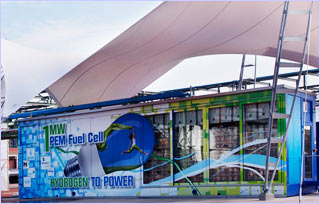 |
||||||
Related: - http://news.discovery.com/tech/one-battery-powers-homes-120209.html - http://www.solvay.com/EN/NewsPress/20120206_fuelcell.aspx Artwork (may include photos, images, audio, and/or video): - http://news.discovery.com/tech/one-battery-powers-homes-120209.html |
||||||
|
||||||
Since January, the Anti-Counterfeiting Trade Agreement (ACTA) has been the subject of protest, mainly online, by people who say it will require signatory countries to punish even non-commercial breaches of copyright with criminal prosecution and jail terms. Germany will not sign onto ACTA, according to the latest reports. The Czech Republic, Poland, and Slovakia have already refused to sign onto ACTA. Tens of thousands of people are expected to take part in protests against ACTA in 60 German cities today, Monsters and Critics News (M&C) reported, citing Deutsche Presse-Agentur (DPA - the German Press Agency). Other protests against ACTA will be taking place throughout Europe, as well as in other parts of the world. Fight For The Future is supporting today's protests by making a global petition and they have provided a map with all the protests, so if you want to attend one you'll know where to find it. |
||||||
 |
||||||
Related: - http://www.panarmenian.net/eng/news/92920 - http://www.destructoid.com/protests-and-petitions-help-bury-acta... - http://killacta.org See Also: - ACTA Artwork (may include photos, images, audio, and/or video): - http://www.destructoid.com/protests-and-petitions-help-bury-acta... |
||||||
|
||||||
At a regional summit this month in Mexico, attended by the leaders of 11 Latin American and Caribbean countries, officials declared that "the authorities in consumer countries should explore all possible alternatives to eliminate exorbitant profits of criminals, including regulatory or market options." ("Market options" is diplomatic code for decriminalization or legalization.) The ideas are not exactly new, but are remarkable for being nearly unanimous. The ideas have been bolstered by opinion leaders in the region, including the former presidents of Brazil, Colombia, and Mexico, who called for the legalization of marijuana and an overhaul of U.S. thinking on the 40-year drug war, which has cost a trillion dollars by some estimates but has done little to reduce supply and demand. Leaders also feel the U.S. "drug war" may be responsible for the transnational cartels that have grown rich and powerful smuggling drugs north into America and, more recently, guns back into their countries. |
||||||
 |
||||||
Related: - http://www.washingtonpost.com/world/latin-american-leaders... See Also: - California Medical Association: Full Marijuana Legalization - Marijuana Decriminalization Bill Passes (Hot Topics, 2011) - Marijuana Legalization Gets New Voice in Washington - Marijuana and the Economy - Exploring Legalized Marijuana Artwork (may include photos, images, audio, and/or video): - http://www.washingtonpost.com/world/inside-mexicos-drug-war/2010... |
|
|
Facebook, Inc.'s initial public stock offering (IPO) paperwork reveals that it plans to wipe out all of the company's federal and state income tax obligations for 2012 and actually generate a half-billion dollar tax refund. (As part of the plan, Facebook co-founder and controlling stockholder Mark Zuckerberg can expect a $2.8 billion after-tax cash windfall.) U.S. Senator Carl Levin, who has proposed to limit the stock option loophole, told the New York Times, "Facebook may not pay any corporate income taxes on its profits for a generation. When profitable corporations can use the stock option tax deduction to pay zero corporate income taxes for years on end, average taxpayers are forced to pick up the tax burden. It isn't right, and we can't afford it." Why should companies get a tax deduction for something that cost them nothing? If an airline allows its workers to fly free or at a discounted price on flights that aren’t full (for vacations, etc.), airlines don't get a tax deduction (beyond actual cost) for that, even though the workers get taxed on the benefit, because it costs the airline nothing. The bottom line is that there's something obviously wrong with a tax loophole that lets highly profitable companies like Facebook make more money after tax than before tax. What's about to happen at Facebook is a perfect illustration of why non-cash "expenses" for stock options should not be tax deductible. Sign the petition and tell Facebook to pay their fair share! |
|
 |
|
Related: - http://www.ctj.org/taxjusticedigest/archive/2012/02/facebooks... - http://www.nytimes.com/2012/02/04/business/zuckerbergs-big-tax... - http://www.change.org/petitions/pay-your-taxes-facebook Of Interest: - http://www.lockergnome.com/social/2012/02/09/four-new-social-networks... Artwork: - http://theantifacebookleague.com |
|
|
|
[UPDATED: Feb. 9, 2012] The U.S. state of Georgia is expected to soon begin construction on two new nuclear reactors at an existing nuclear power facility. While I'm disappointed, and feel it goes against the global trend away from nuclear power, the approval process was set into motion 8 years ago (1). It is the first time new reactors have been considered by the U.S. Nuclear Regulatory Commission (NRC) in over 30 years. There still may be a chance to put a stop to it all. The reactors in Georgia were supposed to be the first in a wave of new projects after the Bush administration set aside $17.5 billion in loan guarantees for nuclear projects. But the planned reactors are now the remnants of a once-anticipated building boom that the power industry dubbed the "nuclear renaissance." The once hoped-for boom has been plagued by a series of problems. The nuclear disaster in Japan last year increased scrutiny of the industry and led to a series of recommendations by the NRC to improve safety. Virtually all of the 31 reactor proposals that had entered the final approval process have been shelved. Parts of the NRC website do not appear to reflect this information, showing only a handful of proposals as being suspended by applicants (2). The proposals were mostly to build new reactors at existing nuclear power facilities, but apparently there are two exceptions (3). The most accurate picture I can put together suggests that of the 31 reactor proposals that entered the final approval process, reactor proposals at two nuclear power facilities (in addition to the Georgia facility) have not been suspended by applicants, or are somehow not in limbo, with applicants who intend to construct them. As best I can tell, they are supposed to be located in South Carolina and Florida. One report notes that the only two new facilities (3) with reactor proposals are in South Carolina and Florida, but there are two other facilities in each of those states listed by the NRC. Another report mentions that the proposed reactors in South Carolina would be built at an existing facility (3). Several reports also suggest that construction on the Florida facility may not begin in the near future. Westinghouse (owned by Toshiba), the manufacturer of the power plants' components in all of the proposals that appear to be under consideration currently, is under sharp criticism over the design. None of these facilities are safe. Not only because of the risk of accidents and meltdowns, but because of the nuclear waste produced and the nature of the fuel required - as well as the risk of a terrorist attack (4). The reactor proposals are also not seen as economically viable, as measured by a number of different economists. And at least 10 anti-nuclear-power groups have threatened to sue the NRC if the project is approved. However, the last thing I want to do is lose my ability to open a dialogue with companies like Westinghouse. I support their efforts to reduce the use of fossil fuels in electricity production. The company also produces solar power systems. But I disagree that solar and wind power cannot stand on their own, as the company has claimed. The evidence simply does not support their claim (4). After this disaster is over with, I hope the company will refocus on solar power along with its other businesses, such as energy-efficient light bulbs. You can contact the NRC to oppose the construction of two new reactors at Georgia's Vogtle facility and South Carolina's VC Summer facility by clicking HERE! (5). You should also voice your disapproval of building any additional nuclear reactors anywhere in the U.S. Click HERE! |
|
 |
|
Notes: - 1) The initial proposal for the design of the reactors that appear to have not been suspended by applicants, or are not somehow in limbo, with applicants who do not intend to construct them, including the two reactors in Georgia, was submitted by Westinghouse to the NRC during Bush's first term, in 2002 - 10 years ago. After the Bush administration won a second term in 2004 - 8 years ago - the design received initial approval from the NRC in 2006 (6 years ago). In 2007 - 1 year later - reactor proposals began streaming in to the NRC from nuclear power facilities (totaling approximately 30 new reactor proposals, mostly at existing nuclear power facilities, during Bush's second term; since some facilities requested more than 1 reactor, there are fewer than 30 facilities considered "applicants"). Only one facility submitted an application (for 2 proposed reactors) after Obama took office in 2009. - 2) The NRC pages accessed were last reviewed by the NRC in March and October of 2011. In March 2011, it appears 6 reactor proposals had been suspended by applicants. By October 2011, it appeared that number had risen to 10 reactors suspended by applicants. My current assumption - based on the media reports I've read, which are listed below - is that 27 reactor proposals are currently suspended, or are at least somehow in limbo, with applicants who don't intend to construct them, out of a total of 31 reactor proposals for existing nuclear power facilities listed by the NRC. - 3) For clarity, there only appear to be 2 proposals for new reactors at facilities that do not already exist. In other words, these are mostly power companies that wanted to add some more reactors to their existing nuclear power plants. By "facility," I do not mean the foundation work shown in some of the photos featured in the articles listed below. Since the "reactor" is technically housed inside another structure, one could consider the new structure a new "facility," but that is not what I mean. With the exception of two new facilities, they're mostly applying to build these "reactors" and "structures" close to their existing "reactors" and "structures" - their existing facilities. - 4) My statements are based on research from current print publications (Discover, Scientific American), library research I've conducted in the past (that project appears in the list below), as well as current Internet research. - 5) The NRC approved the construction of two new reactors at Georgia's Vogtle facility in a split decision, with the chairman of the NRC voting against the approval. You should still contact the NRC and oppose plans to build reactors at both the Vogtle and VC Summer nuclear power facilities. The NRC has not yet approved two proposed reactors at the VC Summer facility, but several reports are predicting the VC Summer proposals may be considered by the NRC in the near future. Voice your disapproval for construction of any new nuclear reactors in the U.S. Click HERE! |
|
Related: - http://money.cnn.com/2012/02/08/news/economy/nuclear_reactors... - http://www.washingtonpost.com/business/economy/nrc-expected-to... - http://abcnews.go.com/Politics/wireStory/nrc-sets-vote-georgia-nuclear... - http://www.nytimes.com/2012/02/09/business/energy-environment... - http://money.cnn.com/2012/02/09/news/economy/nuclear_reactors - http://www.politico.com/news/stories/0212/72680_Page2.html - http://www.nrc.gov/about-nrc/public-affairs/contact-opa.html Of Interest: - http://www.guardian.co.uk/environment/2012/feb/09/windfarm... See Also: - Germany to Close Nuclear Power Plants, Go Green - Help Japan - Coal Mines or Windmills? - Dangerous Profits: Energy, Economics, Environment Artwork (may include photos, images, audio, and/or video): - http://www.bulawayo24.com/index-id-technology-sc-science-byo-2032... |
|
|
|
Around the world, people are moving their money from big banks to "ethical banks," credit unions, and other alternative financial services providers. 10 million Americans have "moved their money" since 2010. And in Britain, a new movement has started to help British consumers "move their money." In fact, March 2012 is "Move Your Money Month." The month when we act together, move our money, and begin to change banking for good. Despite having received the biggest taxpayer bailout in history, the big banks continue to starve the real economy of credit, invest unethically, and pay themselves bloated bonuses. But the tide is turning. Politicians are starting to talk about "responsible capitalism" and boosting the co-operative sector. From civil rights activists creating local banking in the U.S., to British bankers pulling out of apartheid South Africa - change happens when we act. The truth, however, is that banks won't change of their own accord and many politicians and regulators are too narrowly focused on maintaining the status quo. So it's only by moving our money that we're going to create a banking system that works. Where we keep our money matters. According to Ed Mayo, Secretary General of Co-ops UK, "At an individual level, you can't do everything to put an unfair economy right - but you can do something. Move your money is the new fair trade. It is THE campaign for our time." |
|
 |
|
While you're in the process of moving your money, join UK Uncut and Move Your Money on February 10th to protest Barclays Bank in London (Details | Facebook). And on February 13th, join UK Uncut and Disabled People Against Cuts to deliver a protest letter opposing the closure of the Independent Living Fund (ILF) in London (Details). Related: - http://moveyourmoney.org.uk - http://ukuncut.org.uk/blog/move-your-money-uk---a-new-campaign... - http://falseeconomy.org.uk/blog/move-your-money See Also: - Announcing UK Uncut Legal Action - Merkel Changing Her Mind About Austerity - U.K. Cons Plan Backdoor Healthcare Privatization - UK Uncut Protests Barclay's Bank... - A Better Future - Bank Balances - The Corporate Tax: ATM Fees & Other Charges - Banks & Bankruptcy: Torturing America's Consumers Artwork (may include photos, images, audio, and/or video): - http://moveyourmoney.org.uk/resources |
|
|
|
Antibiotics were once the wonder drug. Now, however, an increasing number of highly resistant - and deadly - bacteria are spreading around the world. The killer bugs often originate in factory farms, where animals are treated whether they are sick or not. This is precisely what happened to Ashton Bonds, a 17-year-old student at Staunton River High School in Bedford Co., in the U.S. state of Virginia. Ashton spent a week fighting for his life - and lost. This is probably what also happened to Omar Rivera, a 12-year-old in New York, who doctors sent home because they thought he was exhibiting allergy symptoms. He died that same night. The same thing almost happened at a high school in the town of Belen, New Mexico. Less than two weeks ago, a cheerleader at the school was hospitalized after complaining about an abscess. Twelve other female students had been afflicted with suspicious rashes. All the students tested positive for a bacterium that the U.S. media has dubbed the "superbug." Microbiologists refer to this bacterium as community-acquired methicillin-resistant Staphylococcus aureus, or ca-MRSA. The terrifying thing about it is its resistance to almost all common antibiotics, which complicates treatment. The carelessness with which doctors and farmers are jeopardizing the effectiveness of one of the most important groups of drugs borders on lunacy. Some 900 metric tons of antibiotics are administered to livestock each year in Germany alone. This large-scale use inevitably leads to the spread of resistant bugs. Indeed, antibiotics offer ideal growth conditions to individual bacteria that have naturally become resistant through a small change in their genetic makeup. Simply put, they benefit from the fact that the antibiotics still kill off their competitors, the non-resistant bacteria. In early January, Ilse Aigner, Germany's Minister of Food, Agriculture, and Consumer Protection, unveiled a package of measures aimed at curbing the use of antibiotics in farm animals. The measures include stricter controls that would make it more difficult to add antibiotics urgently needed in human medicine to animal feed. Germany's federal government is also considering suspending veterinarians' right to dispense medicine. The fact that livestock farmers mix antibiotics into feed has to do with production conditions in feedlots. To produce veal, animals from different sources that are too weak for milk and beef production - and likewise more susceptible to infectious diseases - are often jammed into enclosures. Pigs are usually kept in very small spaces, making them very aggressive and causing them to fight. Their wounds have to be treated with antibiotics. In the past, it took 80 days until a chicken was ready for slaughter. Today it's only 37 days. Chicken farmers have a profit margin of only a few cents per animal. To minimize losses through disease, poultry producers and their veterinarian helpers use antibiotics as a preventive tool. According to Jan Kluytmans, a microbiologist at Amphia Hospital in the southern Dutch city of Breda, "At some point in the coming years, there will be a disaster involving resistant pathogens with many casualties. Only then will something change." I'm for doing away with factory farms, producing "free-range" meat free of antibiotics, and promoting vegetable-based meat substitutes and "lab meat." But it appears Germany's federal government, along with the Minister of Food, Agriculture, and Consumer Protection, are at least attempting to take an important step in the right direction. |
|
 |
|
Related: - http://www.spiegel.de/international/world/0,1518,811560,00.html See Also: - Frankenfish: Genetically Engineered Salmon - Ex-Military Thugs Now Enforce Genetic Patents - Animals and Vegetarianism Artwork (may include photos, images, audio, and/or video): - http://scienceprogress.org/2009/06/factory-farming-ethics |
|
|
|
Olestra is a fat substitute used to lower or eliminate the fat content of certain foods, especially in the U.S. The brand-name for olestra in the U.S. is Olean. It works by combining sugar and fat molecules, making the resulting olestra molecule so large, it can't be digested. It passes straight through the body and is "pooped out." Thus, olestra also has zero calories. Olestra looks, feels, and tastes like regular cooking oil. It has been used to make U.S.-style "potato chips," "corn chips," and "cookies" targeted at people looking to reduce or eliminate the fat in those products. In terms of taste, texture, and "fullness," products prepared with olestra are virtually indistinguishable from products prepared with vegetable oil. But olestra has not been without controversy. After it initially started appearing in foods in the U.S. in 1998, foods prepared with olestra had to carry a label that warned of "loose stools" and associated symptoms. The label also talked about vitamin absorption (1). As more research was conducted on olestra, the warning label was eventually removed. Concerns remain about whether olestra helps people lose weight or control their fat intake. These concerns, along with the concerns initially expressed on the warning label, have caused olestra to be approved for use only in certain manufactured foods. Recently, the list was expanded to include foods like doughnuts, cakes, and pies. Here's the way I see it. With roughly 1 in 3 Americans struggling with issues related to obesity - such as diabetes, high blood pressure, and heart disease - along with the obesity epidemic itself, I think olestra is okay. Even if all the risks associated with olestra are taken in the extreme case, those risks seem minor compared to the kinds of problems olestra may help solve. Some of the concerns about olestra have already been put to rest. The issue of whether malnutrition could result from the fact that vitamins A, D, E, and K were pooped out along with olestra seems overblown. The current formulation of olestra adds these vitamins back in. You should theoretically not suffer from problems with absorbing these vitamins even if you eat products containing olestra all day, every day. As far as "loose stools," it occurs only in about 2% of people who consume products containing olestra. But let's be honest. If you're shoveling in a dozen doughnuts for breakfast, why would you worry about "loose stools?" You've got bigger problems. The main problem many doctors, scientists, and specialists have with olestra is actually related to eating a dozen doughnuts for breakfast. The concern is that foods prepared with olestra will cause people to "go crazy" and "eat like pigs." Well, a lot of these people already have poor eating habits. In studies on humans, olestra did not cause people to eat more than they ordinarily would. The real question here is whether olestra can be used as part of the solution to America's obesity epidemic. How widely available does it need to be in order for it to be successful? Even with full approval, will it ever be widely available? Will fast-food restaurants offer french fries and fried chicken cooked in it? And what about efforts to discourage people with poor eating habits from eating fast foods and snack foods (1)? These are complicated problems. It does not appear Americans are slimming down, though. So I figure olestra could at least help a little. I eat healthy, but I would love some fried chicken cooked in olestra! |
|
 |
|
| NewsKing is not affiliated with these products, and no endorsement is implied. | |
Notes: - 1) The drug "Alli" (Orlistat) has all the same problems that olestra does. Instead of altering the fat you eat, it partially blocks your body's ability to absorb the fat you eat. While many countries (including the U.S.) have approved Orlistat as an over-the-counter drug, most countries have not approved olestra. Many of those countries also do not suffer from the obesity epidemic that the U.S. suffers from. I find all of that very interesting, but it's for another day... Related: - http://en.wikipedia.org/wiki/Olestra - http://www.zug.com/pranks/olestra - http://www.cspinet.org/olestra - http://www.cspinet.org/olestra/11cons.html - http://www.pgfoodingredients.com/default.asp Artwork (may include photos, images, audio, and/or video): - http://enquirer.com/editions/2000/06/23/fin_canadian_ban_adds_to.html |
|
|
|
I can't believe I missed this! The article featured in this post is dated November 2011. I found the article after reading "Quickstart" in the current issue of Maximum PC magazine. I've written about batteries before, so this is something I'm interested in, and I'm very encouraged by this new development in lithium-ion batteries. Lithium-ion batteries are used in everything from electric cars and hybrids to smartphones and laptop computers... Imagine a cellphone battery that stayed charged for more than a week and recharged in just 15 minutes. That dream battery could be closer to reality thanks to Northwestern University research. A team of engineers has created an electrode for lithium-ion batteries - rechargeable batteries such as those found in cellphones and iPods - that allows the batteries to hold a charge up to 10 times greater than current technology. Batteries with the new electrode also can charge 10 times faster than current batteries. Generally, batteries have both anode and cathode electrodes. This research was focused on the anode. With current technology, the performance of a lithium-ion battery is limited in two ways. Its energy capacity - how long a battery can maintain its charge - is limited by the charge density, or how many lithium ions can be packed into the anode or cathode. Meanwhile, a battery's charge rate - the speed at which it recharges - is limited by another factor: the speed at which the lithium ions can make their way from the electrolyte into the anode. Harold H. Kung - lead author of the paper - and his research team combined two techniques to combat both these problems. First, to stabilize the silicon used in the new battery and help maintain maximum energy capacity, they sandwiched clusters of silicon between graphene sheets. This allowed for a greater number of lithium atoms in the electrode while utilizing the flexibility of graphene sheets to accommodate the volume changes of silicon during use. Second, Kung's team used a chemical oxidation process to create miniscule holes (10 to 20 nanometers) in the graphene sheets - termed "in-plane defects" - so the lithium ions would have a "shortcut" into the anode and be stored there by reaction with silicon. This reduced the time it takes the battery to recharge by up to 10 times. Next, the researchers will begin studying changes in the cathode that could further increase effectiveness of the batteries. They also will look into developing an electrolyte system that will allow the battery to automatically and reversibly shut off at high temperatures - a safety mechanism that could prove vital in electric car applications. |
|
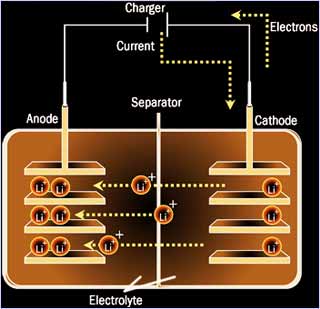 |
|
Related: - http://www.northwestern.edu/newscenter/stories/2011/11/batteries... - http://www.ecogeek.org/component/content/article/2918 Artwork (may include photos, images, audio, and/or video): - http://electronics.howstuffworks.com/everyday-tech/lithium-ion... |
|
|
|
Here's some motivation for everyone that will hopefully get you fired up! "History will have to record that the greatest tragedy of this period of social transition was not the vitriolic words and the violent actions of the bad people, but the appalling silence and indifference of the good people. Our generation will have to repent not only for the words and acts of the children of darkness, but also for the fears and apathy of the children of light." - Rev. Martin Luther King, Jr. - January 27, 1965, Atlanta, Georgia |
|
 |
|
Related: - http://gettheflick.blogspot.com/2008/08/fired-up.html Artwork (may include photos, images, audio, and/or video): - http://www.vtnews.vt.edu/articles/2010/01/2010-30.html |
|
|
|
|
|
 |
|
| NewsKing is not affiliated with these products, and no endorsement is implied. | |
Notes: - 1) You'll see a lot of these on ingredient labels. Ingredient and nutrition labels are another interesting story. The way I heard it, one woman spent her entire adult life fighting food manufacturers to get the U.S. government to require ingredient and nutrition labels on manufactured foods. I'll have to research the story... Related: - Not again! I've already done this one! HELP! Artwork (may include photos, images, audio, and/or video): - http://foodfetepress.wordpress.com/2011/06/25/stevia-in-the-raw - http://www.misskim.typepad.com/justmisskim/2009/10/10-things-im... - http://stuffmybrainthinks.wordpress.com/tag/truvia - http://www.stratasfoods.com/brandOverview.aspx?brand_id=42 - http://www.akblessingsabound.com/2009/03/truvia-natural-sweetener.html - http://jugalbandi.info/2007/05/artificial-sweeteners - http://www.sciencedaily.com/releases/2008/12/081210090819.htm - http://www.surebaby.com/blog/2010/01/08/artificial-sweeteners/# |
|
|
|
[UPDATED: Jan. 24, 2012] This is a cautionary tale to keep in mind as reformers in the U.S. and Britain push their "welfare scroungers" rhetoric. Fashioned to target young, African-American single mothers, former U.S. President Ronald Reagan had, in a vicious, evidence-free campaign against so-called "welfare queens," assured his voting public that people were fraudulently collecting benefits and living it up on welfare. Reagan's punitive, biased-in-favour-of-marriage "PRWORA" legislation introduced lifetime time-limits for benefit eligibility, compulsory attendance at unpaid jobs in return for benefits (workfare), and heavy sanctions (full or partial benefit cuts) for non-attenders. It also devolved responsibility for managing (and cutting) welfare rolls to states. That development (or deterioration) in the labor market structure is the real issue. It's worth noting that in that structure, paid employment doesn't necessarily reduce a worker's need for some state support either. David Ward, from the Direct Care Alliance in New York, told sources that careworkers his organization represents are often paid so poorly that they rely on food stamps and Medicaid and other support to make ends meet. That's the experience of many low-paid workers across the U.S. Their problem isn't laziness, or scrounging. Their problem is that their wages are so low they can't feed their families on their earnings. Workfare simply gives companies and organizations another pool of very cheap, and disposable, workers. Unions certainly saw that point in New York. Several years into the city's workfare program, District Council 37, a union which represented municipal employees, took former New York Mayor Rudolph Guiliani to court, saying that his workfare program "had illegally replaced nearly 2000 unionized clerical workers with unpaid welfare recipients in three agencies." PRWORA was engineered by enemy of reason Newt Gingrich and other Republicans like Eugene Clay Shaw, who were emboldened by sweeping mid-term victories. PRWORA established TANF (Temporary Assistance for Needy Families) as the main welfare program for families with dependent children under 18. All states had to put a percentage of their welfare populations in work-related activities (like workfare) for about 30 hours a week, enforce sanctions for non-attenders and cut benefits to people who'd reached those new eligibility time limits. Unsurprisingly, the number of people on welfare dropped dramatically as TANF was rolled out. Some may have found jobs and enough hours at them to make up their low pay. Others simply disappeared - into the grey economy, or the growing band of poor and homeless as we saw last time in New York. The aim of modern welfare reform is to slash welfare rolls. Neither need, nor entitlement, bulk large in the minds of welfare-to-work architects. Britain isn't perfect. But their welfare system offers something that everyone can be proud of. It's a comforting thought that if tomorrow you lost your job, your home, or even a limb, society would be there to help you through it. At least until now. The government's Welfare Reform Bill is just weeks away from becoming law and is the biggest threat the welfare system has faced in its history. The Bill will take vital lifelines from the most vulnerable people in society. Right now, 500,000 families stand to lose their homes. Others will become imprisoned in them. Half a million will lose their disability allowance, including disabled children. People with terminal illnesses will be forced into work, and 3.2 million will be put through cruel tests that are pushing some to take their own lives. Millions of people - pensioners, low waged workers, the disabled, sick and unemployed - will fall deeper into poverty. The government's excuse for all this? The deficit, of course. Yet it continues to turn a blind eye to the billions in tax dodged by corporations and rich individuals every year, a sum greater than the projected savings of Britain's Welfare Reform Bill. Telecommunications giant Vodafone's brand new tax dodge alone could pay for all of the cuts to the British Disability Living Allowance, which affects 500,000 people. British leaders like Cameron, Osborne, Clegg and Co. are choosing to inflict suffering on sick and disabled people rather than tackle rich tax dodgers, because they think the poor and vulnerable are invisible - that they won't or can't make a fuss - and the rest of us don't care. On Saturday, January 28th, in central London, a group of disabled, sick, and elderly people are going to engage in a daring and disruptive act of civil disobedience, and they've asked for our support. If you're in London, meet at 11:30am at Holborn tube station with a charged Oyster card, ready to travel to a secret location. |
|
 |
|
Links: - https://www.facebook.com/ukuncut - http://twitter.com/#!/search?q=%23hardesthit - http://touchstoneblog.org.uk/2012/01/minister-for-work-says-unemployed... Related: - http://falseeconomy.org.uk/blog/failure-of-workfare-in-the-us - http://falseeconomy.org.uk/blog/the-cruel-truth-about-us-workfare - http://ukuncut.org.uk/blog/message-from-the-invisible - Linked text was not listed here for simplicity, but click on it! Artwork (may include photos, images, audio, and/or video): - http://ukuncut.org.uk/blog/message-from-the-invisible |
|
|
|
ACTA is yet another attack against the sharing of culture on the Internet. ACTA (Anti-Counterfeiting Trade Agreement) is an agreement secretly negotiated by a small "club" of like-minded countries (39 countries, including the 27 in the European Union, the United States, Japan, etc.). Negotiated instead of being democratically debated, ACTA bypasses parliaments, legislatures, and international organizations to dictate a repressive logic dictated by the entertainment industries. ACTA would impose new criminal sanctions forcing Internet actors to monitor and censor online communications. It is thus a major threat to freedom of expression online and creates legal uncertainty for Internet companies. In the name of trademarks and patents, it would also hamper access to generic medicines in poor countries. Click HERE to take action against ACTA now! |
|
 |
|
| Click the play button above to start the video. | |
 |
|
| Click the play button above to start the video. | |
Related: - http://www.laquadrature.net/acta - http://www.laquadrature.net/wiki/How_to_act_against_ACTA - http://www.youtube.com/watch?v=citzRjwk-sQ&feature=g-all-f&context... - http://www.youtube.com/watch?v=dmQN93NqqDM&feature=g-user-lik... Artwork (may include photos, images, audio, and/or video): - http://www.youtube.com/watch?v=citzRjwk-sQ&feature=g-all-f&context... - http://www.youtube.com/watch?v=dmQN93NqqDM&feature=g-user-lik... |
|
|
|
Let's face the facts. This blog - this whole site - moves at the pace of a snail crawling across the back of a turtle (in the opposite direction). I still have a huge backlog of "ideas" I want to write about. There's probably a lot of stuff I should just put in "Hot Topics," but I think, "No, I'll write about that; 'Hot Topics' doesn't do it justice." Then everything sits around for years in my bookmarks. I can't just dump "ideas" into "Features and Announcements" anymore, either. That got way out of hand and it's hard to clean up. It's better to post something and delete it if I don't like it, I think... Today I'm going to ride my bicycle (indoors, on the trainer, so I can wear shorts in the cold weather), but I also need to tighten the bottom bracket. That requires disassembly. I could have more time on the computer by waiting to tighten the bottom bracket, but if the left crank arm is pulled to the right any further, it will damage the crank arm (eventually) and cost me hundreds of dollars to repair. Anyway, I'd rather be watching PBS or the Discovery Channel or some shit and screaming about the graph in a Wired article. But tonight, I'm going to do a post on ACTA and another post on Welfare reform in Britain (and in the U.S. - this is a good one!). It'll only be a start, but a lot of the work has been done for me. And the issues are important to me. Sorry about the way this is. But let's get real! |
|
 |
|
Artwork (may include photos, images, audio, and/or video): - http://tlc.howstuffworks.com/family/how-to-draw-a-turtle.htm - http://www.busymomdahl.org/2009/06/kayleighs-snails-are-snoring |
|
|
|
I checked out Occupy DC and took some pictures - Here they are! I met a lot of cool people and had a very nice time. The Occupy Movement is still going strong. Be sure to check out my other posts (which include more photos from Occupy DC), and participate in the movement! |
|
 |
|
 |
|
 |
|
Links: - Information: http://october2011.org; http://occupydc.org - Travel and Hotel: Info - http://twitter.com/#!/StopTheMach2011 - http://www.facebook.com/pages/Stop-the-Machine-Create-a-New... - http://www.occupytogether.org - http://twitter.com/#!/search/%23occupydc (#OccupyDC) - http://occupydc.org Donate: - Paypal donation listed by October2011.org - Call 202-544-9355 to donate to October2011.org - Paypal & Bitcoin donation listed by OccupyDC.org - WePay donation for solar power at occupation - FireDogLake donation for various occupations - Call 202-477-7685 to donate food from Henry's Soul Cafe - Call 202-667-0032 to donate food from Jumbo Pizza - Donate food through Food Not Bombs online See Also: - Occupy Movement - Occupy Wall Street |
|
|
|
Happy New Year! |
| Working
Disclaimer: Your feedback will be interpreted with these statements
in mind... This is not professional writing. It does not necessarily reflect the views of the author(s). It does not reflect the views associated with "Newsking sites" or associated entities. I sometimes put my foot in my mouth in a big way, which is why this blog can't be associated with my professional writing. My social responsibility for "blogging" has so far been undefined by society, but I do not intend for this to affect my public life. Prior entries may be edited. I may or may not use "drugs," alcohol, and certain foods in the production of this "blog." I did not "just solve a problem" or "just cause a problem." For anyone. This blog occasionally contains humor. This blog may contain numerous links to outside content. A small portion of this content may contain information some readers may find offensive. I want to apologize to anyone who is offended. Links or references to outside content do not imply an endorsement. References to outside content are not always Internet-based (i.e. artwork, books, magazines, radio, television, film, and other media). No endorsement of any outside content is implied. Every effort is made to ensure this site complies with about 25 editing "rules," including spellling, grammar, punctuation, accuracy, HTML, etc. Your "experience" is important. Please enjoy yourself! |
| Gift Shop | |||||||||||||||||||||||||||
|
| © 2012
by T.J. Newton. All Rights Reserved. A more detailed copyright policy should be forthcoming. It will probably be similar to this one. |